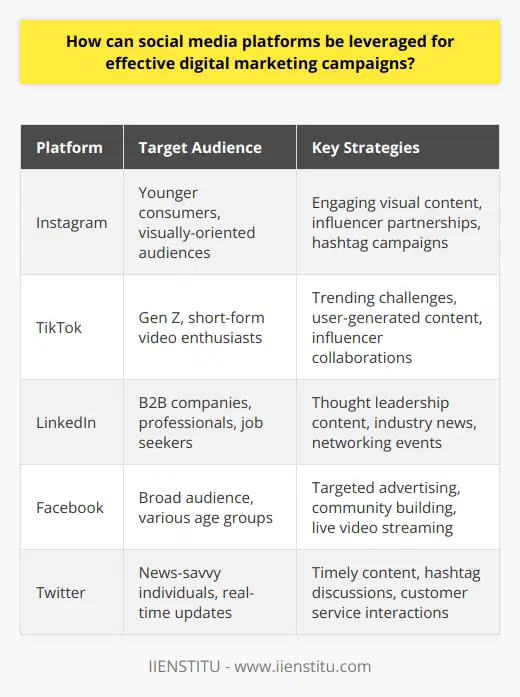
You know, when I first dipped my toes into the vast ocean of digital marketing, I felt both excited and overwhelmed. It's a field that's ever-evolving, with new strategies and tools popping up almost daily. Rate my expertise in digital marketing? Well, that's a question I've pondered deeply, especially when preparing for job interviews.
Reflecting on Personal Growth in Digital Marketing
Let me share a bit of my journey. I remember attending my first digital marketing workshop during college. The instructor asked us to rate our knowledge on a scale from one to ten. I hesitated and thought, "Am I a beginner just because I'm new, or do my self-taught skills count for something?" It's a tricky question, isn't it?
Firstly, employers want to assess your self-awareness and how accurately you evaluate your own capabilities.
Secondly, they aim to determine if your expertise aligns with the requirements of the position.
Lastly, the question gives them an insight into your ability to communicate effectively and present yourself in a concise and confident manner.
When employers ask, "Rate your expertise in digital marketing," they're not just looking for a number. They want to see self-awareness, honesty, and a genuine understanding of where you stand. It's about showcasing your journey, the skills you've honed, and how you approach continuous learning.
How To Start A Digital Marketing Agency From Scratch Step By Step Guide
How To İncrease Website Visibility And Ranking İn Search Engine Results
Understanding the Employer's Perspective
From an employer's standpoint, this question serves multiple purposes:
1- Assessing Self-awareness: They want to see if you're realistic about your abilities.
2- Alignment with Job Requirements: Do your skills match what they're looking for?
3- Communication Skills: Can you articulate your experiences effectively?
Beginner Level: If you are relatively new to the field of digital marketing, you can rate your expertise as beginner level. However, make sure to mention any relevant coursework, certifications, or practical projects you have completed to demonstrate your commitment to learning and gaining knowledge in the field.
Intermediate Level: If you have a few years of experience in digital marketing and have successfully executed campaigns across multiple channels, you can rate yourself as an intermediate-level professional. Highlight specific areas of expertise such as social media marketing, content creation, SEO, or paid advertising where you have achieved measurable results.
Advanced Level: If you have extensive experience and a proven track record in digital marketing, you can rate your expertise as advanced level. Emphasize your ability to develop comprehensive digital marketing strategies, optimize conversion funnels, analyze data, and manage cross-channel campaigns. Mention any notable achievements, such as significant increases in website traffic or conversion rates.
Expert Level: If you consider yourself an expert in digital marketing, provide detailed evidence of your expertise. Talk about your experience managing large-scale campaigns, developing innovative marketing strategies, and leading teams to success. Highlight your thought leadership, speaking engagements, publications, or industry awards to reinforce your claim as an expert.
It's crucial to remember that digital marketing isn't just about technical skills; it's also about strategic thinking, creativity, and adaptability.
Navigating Different Levels of Expertise
So, how do you rate yourself? Here's how I approached it:
Beginner Level
When I was just starting, I acknowledged my beginner status, but I didn't stop there. I highlighted:
Relevant coursework from college.
Online certifications I completed, like the Google Ads certification.
Personal projects, such as managing a friend's small business social media.
Intermediate Level
After a couple of years, I felt comfortable moving up to an intermediate level:
I had managed social media campaigns that increased engagement by 30%.
I learned about SEO optimization and improved website rankings for clients.
I started experimenting with email marketing and saw significant open rates.
Advanced Level
Reaching an advanced level meant:
Developing comprehensive digital marketing strategies for multiple clients.
Analyzing data to optimize campaigns and improve ROI.
Leading a small team, mentoring junior marketers.
Expert Level
Calling oneself an expert is a big claim. For me, it would mean:
Innovating new digital marketing techniques.
Speaking at industry conferences.
Being published in reputable marketing journals.
But honestly, even now, I hesitate to use the term "expert" because there's always more to learn in this field.
Tips for Answering the Question Effectively
On a scale of 1 to 10, how would you rate your expertise in digital marketing?
How would you describe your level of proficiency in digital marketing?
Can you provide an assessment of your skills and knowledge in the field of digital marketing?
In your opinion, how well-versed are you in the realm of digital marketing?
Are you confident in your abilities to navigate and excel in digital marketing?
Would you consider yourself a novice, an intermediate, or an advanced professional in digital marketing?
What level of expertise do you possess in digital marketing, ranging from beginner to expert?
Have you honed your skills enough to be considered a specialist in digital marketing?
Are you experienced enough to confidently handle various aspects of digital marketing campaigns?
How would you rate your knowledge and proficiency in implementing effective digital marketing strategies?
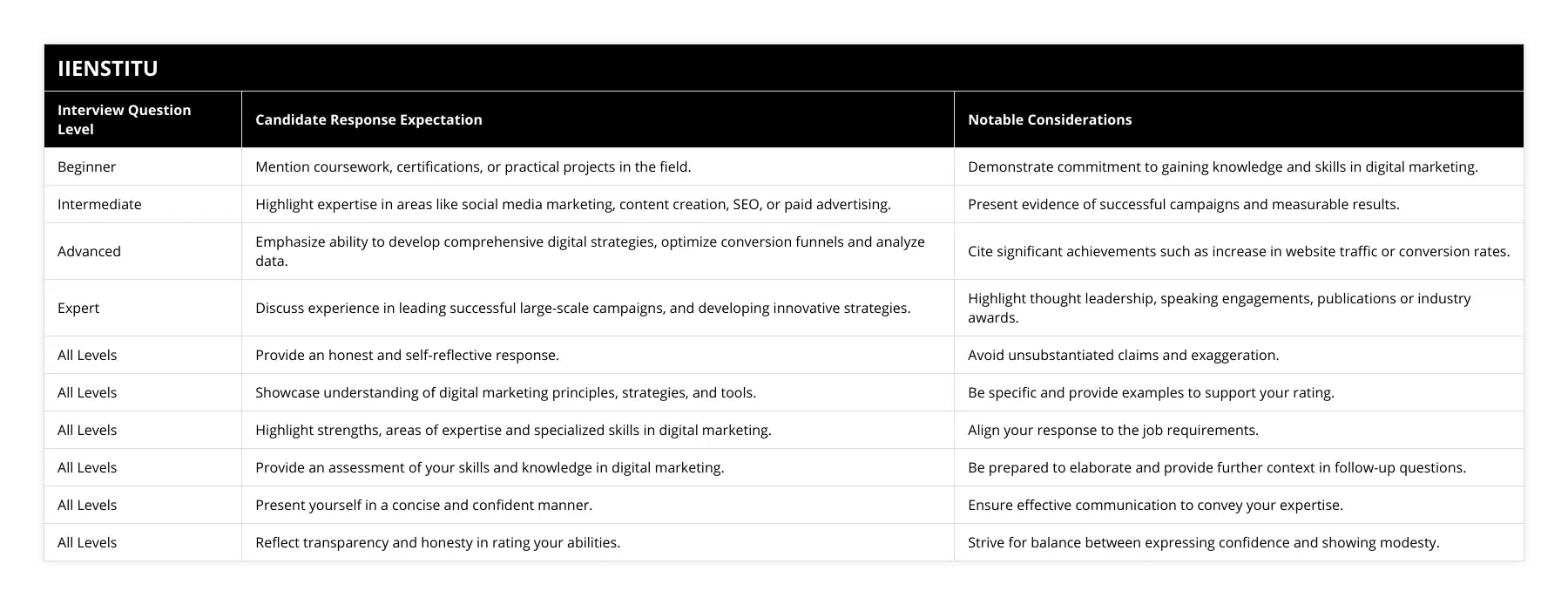
When you're faced with this question in an interview, here are some tips I've found helpful:
1- Be Honest: Don't oversell yourself, but don't underestimate your skills either.
2- Provide Examples: Support your self-assessment with specific accomplishments.
3- Show Willingness to Learn: Express your enthusiasm for continuous growth.
4- Align with the Role: Tailor your answer to the job description.
For instance, if the role requires social media expertise, focus on your experience and results in that area.
The Importance of Self-Awareness and Authenticity
Employers appreciate candidates who are genuine. When I interviewed for my last position, I told them:
"I consider myself at an intermediate level. I've had success with social media campaigns and SEO, but I'm eager to learn more about PPC advertising and analytics."
This honesty led to a deeper conversation about the company's needs and how I could grow with them.
Incorporating Digital Marketing Trends
Staying updated with emerging trends is also vital. Mention any new skills you're acquiring or trends you're following. For example:
Influencer marketing
Artificial intelligence in marketing
Voice search optimization
By showing that you're proactive, you demonstrate both expertise and potential.
Balancing Confidence and Modesty
It's a delicate balance. You want to project confidence without coming across as arrogant. Underlining your achievements while acknowledging areas for growth can make a strong impression.
Linking Digital Marketing to Broader Business Objectives
Understanding how digital marketing fits into the larger business context is crucial. Remember when I mentioned increasing engagement by 30%? I also tied that back to how it led to a 15% increase in sales conversions.
In one of my projects, I had to optimize supply chain management process tips to ensure our marketing campaigns aligned with inventory and delivery capabilities. Integrating marketing strategies with supply chain processes ensured we didn't over-promise and under-deliver, maintaining customer satisfaction.
Preparing for Follow-Up Questions
Be ready to delve deeper. If you rate yourself highly in SEO, you might be asked:
"What's your approach to keyword research?"
"Can you share results from a campaign you managed?"
Having concrete examples and being specific can set you apart.
Similar Questions You Might Encounter
Sometimes, interviewers phrase the question differently:
"On a scale of 1 to 10, how would you rate your expertise in digital marketing?"
"How would you describe your level of proficiency?"
"Can you provide an assessment of your skills and knowledge?"
Recognizing these variations helps you prepare and respond confidently.
Embracing Continuous Learning
Digital marketing is a field where learning never stops. I've made it a habit to:
Attend workshops and webinars.
Read the latest editions of "Digital Marketing Strategy" by Simon Kingsnorth.
Participate in online forums and discussions.
Being a lifelong learner not only enhances your skills but also shows potential employers your dedication.
Conclusion
Reflecting on our own expertise isn't always easy, but it's a valuable exercise. By honestly assessing our skills, highlighting our experiences, and expressing a desire to grow, we present ourselves as well-rounded candidates.
Next time you're preparing for an interview and pondering, "How do I rate my expertise in digital marketing?", remember to:
Be honest and specific.
Provide real examples.
Align your skills with the job requirements.
Show enthusiasm for learning.
And most importantly, just be yourself. Authenticity goes a long way in making a lasting impression.
References
1- Kingsnorth, S. (2019). Digital Marketing Strategy: An Integrated Approach to Online Marketing. Kogan Page Publishers.
2- Deiss, R., & Henneberry, R. (2020). Digital Marketing For Dummies. For Dummies.
3- Dodson, I. (2016). The Art of Digital Marketing: The Definitive Guide to Creating Strategic, Targeted, and Measurable Online Campaigns. Wiley.
4- Smith, P.R. (2017). Marketing Communications: Integrating Offline and Online with Social Media. Kogan Page Publishers.
5- Chaffey, D., & Smith, P.R. (2017). Digital Marketing Excellence: Planning, Optimizing and Integrating Online Marketing. Routledge.
6- Charlesworth, A. (2018). Digital Marketing: A Practical Approach. Routledge.
Additional Tips and Strategies
Bullet Points for Quick Recap:
Be honest and self-aware in your self-assessment.
Support your rating with specific examples.
Align your skills with the job description.
Prepare for follow-up questions by having detailed examples ready.
Show your enthusiasm for continuous learning.
Numbered Steps for Interview Preparation:
Review the job description carefully.
List your skills and experiences relevant to the role.
Rate your expertise honestly in each area.
Prepare examples that demonstrate your skills.
Practice your responses to common interview questions.
Definitely, navigating the question of rating your expertise can seem daunting, but with reflection and preparation, it becomes an opportunity to shine. After all, every expert was once a beginner, and acknowledging your journey is part of what makes you stand out.
Frequently Asked Questions
What are your strengths and weaknesses in digital marketing?
In the realm of digital marketing, recognizing one's strengths and weaknesses is crucial for personal and professional growth. By identifying areas of proficiency and aspects that require improvement, individuals can strategically focus their efforts to enhance their skills and overall effectiveness in the digital marketing landscape.
Strengths in Digital Marketing
One of my key strengths in digital marketing is my ability to analyze and interpret data. I possess a keen eye for patterns and trends, allowing me to derive meaningful insights from complex datasets. This analytical aptitude enables me to make data-driven decisions and optimize marketing strategies accordingly.
Another strength I bring to the table is my creativity in content creation. I have a knack for crafting compelling and engaging content that resonates with target audiences. Whether it's writing blog posts, designing social media graphics, or developing email campaigns, I strive to deliver content that captivates and converts.
Adaptability and Continuous Learning
In the fast-paced world of digital marketing, adaptability is essential. I pride myself on my ability to stay updated with the latest industry trends and technologies. I actively seek out opportunities to learn and expand my skill set, ensuring that I remain at the forefront of digital marketing best practices.
Weaknesses in Digital Marketing
Despite my strengths, I acknowledge that there are areas where I need improvement. One weakness I have identified is my limited experience with certain advertising platforms, such as Google Ads or Facebook Ads. While I have a basic understanding of these platforms, I recognize the need to deepen my knowledge and gain hands-on experience to maximize their potential.
Time Management and Prioritization
Another weakness I am actively working on is time management and prioritization. In the fast-paced digital marketing environment, juggling multiple projects and deadlines can be challenging. I am learning to prioritize tasks effectively, set realistic goals, and manage my time efficiently to ensure optimal productivity and meet client expectations.
Overcoming Weaknesses
To address my weaknesses, I am proactively seeking mentorship and guidance from experienced professionals in the field. I believe in the power of continuous learning and am committed to enrolling in relevant courses, attending workshops, and staying updated with industry blogs and publications.
Conclusion
By acknowledging both my strengths and weaknesses in digital marketing, I am better positioned to leverage my skills and work on areas that require improvement. Through a combination of self-awareness, continuous learning, and a growth mindset, I am confident in my ability to excel in the dynamic and ever-evolving digital marketing landscape.

How do you stay up-to-date with the latest digital marketing trends and best practices?
Staying up-to-date with the latest digital marketing trends and best practices is crucial for marketers. One effective way to stay informed is by regularly reading industry blogs and news websites. These resources provide valuable insights into emerging trends, case studies, and expert opinions. Subscribing to newsletters from reputable sources ensures that relevant information is delivered directly to your inbox. Attending industry conferences and webinars is another excellent method to learn from thought leaders and network with peers. These events offer opportunities to discuss challenges, share experiences, and gain new perspectives. Social media platforms, such as LinkedIn and Twitter, are also valuable tools for staying connected with industry professionals and discovering new content. Following influencers and participating in online discussions can help you stay engaged and informed. Additionally, experimenting with new technologies and platforms allows marketers to gain first-hand experience and understand their potential applications. By consistently dedicating time to learning and exploring, marketers can stay ahead of the curve and adapt to the ever-evolving digital landscape.
Read Industry Blogs and News Websites
Industry blogs and news websites are excellent sources of information for digital marketers. These resources provide timely updates on emerging trends, best practices, and case studies. By regularly reading articles from reputable sources, marketers can gain valuable insights and stay informed about the latest developments in the field. Many websites offer free subscriptions to their newsletters, ensuring that relevant content is delivered directly to your inbox. This makes it convenient to stay up-to-date without having to actively search for information.
Attend Industry Conferences and Webinars
Attending industry conferences and webinars is another effective way to stay current with digital marketing trends. These events bring together thought leaders, experts, and professionals from various companies and backgrounds. They provide opportunities to learn from keynote speakers, participate in workshops, and engage in discussions with peers. Conferences and webinars often cover a wide range of topics, allowing marketers to deepen their knowledge in specific areas of interest. Additionally, these events offer valuable networking opportunities, enabling marketers to connect with like-minded individuals and build professional relationships.
Leverage Social Media Platforms
Social media platforms, such as LinkedIn and Twitter, are powerful tools for staying up-to-date with digital marketing trends. These platforms allow marketers to follow industry influencers, thought leaders, and relevant hashtags. By engaging with content shared by experts, marketers can gain insights into emerging trends and best practices. Social media also enables marketers to participate in online discussions, ask questions, and share their own experiences. This interactive aspect of social media helps foster a sense of community and facilitates knowledge sharing among professionals.
Experiment with New Technologies and Platforms
Hands-on experience is invaluable when it comes to staying up-to-date with digital marketing trends. Marketers should actively seek opportunities to experiment with new technologies and platforms. This can involve creating test campaigns, exploring new ad formats, or leveraging emerging social media channels. By personally engaging with these tools, marketers can gain a deeper understanding of their capabilities and limitations. Experimentation also allows marketers to identify potential applications and develop innovative strategies for their own campaigns.
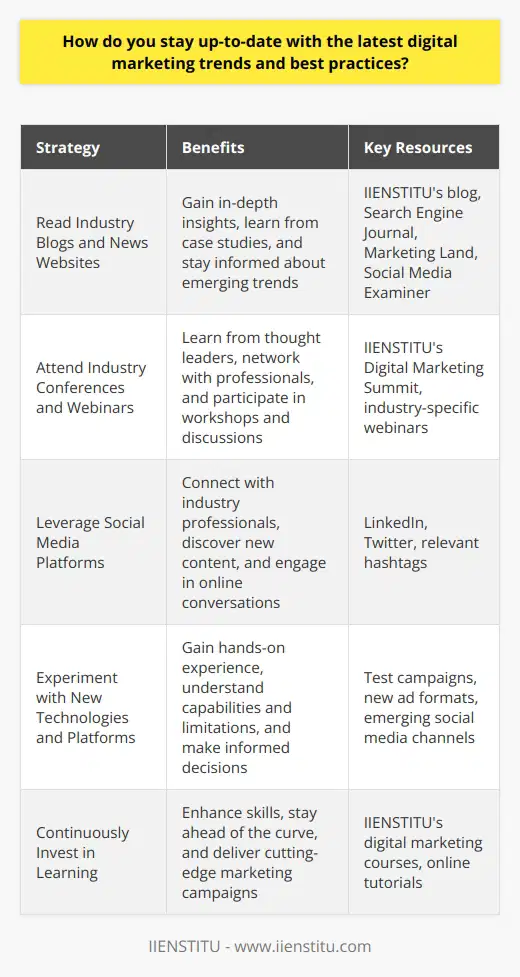
Can you describe a successful digital marketing campaign you have worked on and explain your role in its success?
I have had the privilege of working on several successful digital marketing campaigns throughout my career. One notable example was a campaign I led for a fashion e-commerce brand, where my role was to develop and execute a comprehensive social media marketing strategy. The objective was to increase brand awareness, drive website traffic, and ultimately boost sales.
Developing the Strategy
To begin, I conducted thorough research on the target audience, analyzing their preferences, behaviors, and social media habits. Using this information, I created a content plan that focused on delivering engaging and visually appealing posts across various social media platforms, including Instagram, Facebook, and Twitter. The content mix consisted of product showcases, styling tips, and user-generated content to foster a sense of community and authenticity.
Influencer Marketing
A key component of the strategy was influencer partnerships. I identified and collaborated with fashion influencers whose audiences aligned with our target market. These influencers created sponsored content featuring our products, which helped expand our reach and generate buzz around the brand. I worked closely with the influencers to ensure their content aligned with our brand guidelines and effectively showcased our products.
Paid Social Media Advertising
To further amplify the campaign's reach, I implemented a targeted paid social media advertising campaign. I created ad sets tailored to specific audience segments, leveraging the insights gained from our research. The ads featured compelling visuals and copy, driving users to our website and encouraging them to make a purchase. I continuously monitored and optimized the ad performance to ensure maximum return on investment.
Measuring Success
Throughout the campaign, I closely tracked key performance indicators such as website traffic, engagement rates, and conversion rates. I used analytics tools to measure the effectiveness of our social media efforts and made data-driven decisions to refine the strategy as needed. Regular reporting and communication with the client ensured they were kept informed of the campaign's progress and success.
Results
The campaign yielded impressive results, with a significant increase in website traffic and a higher conversion rate compared to previous periods. The influencer partnerships generated a substantial amount of user-generated content, which we leveraged to create a sense of social proof and trust among potential customers. The brand's social media following grew exponentially, and we observed a notable uplift in sales attributed to the campaign.
Conclusion
My role in this successful digital marketing campaign involved developing a comprehensive strategy, executing it across multiple channels, and continuously optimizing based on data-driven insights. By leveraging influencer partnerships, targeted paid advertising, and engaging content, we were able to achieve the campaign objectives and deliver measurable results for the client. This experience demonstrates my ability to plan, execute, and manage effective digital marketing campaigns that drive business growth.
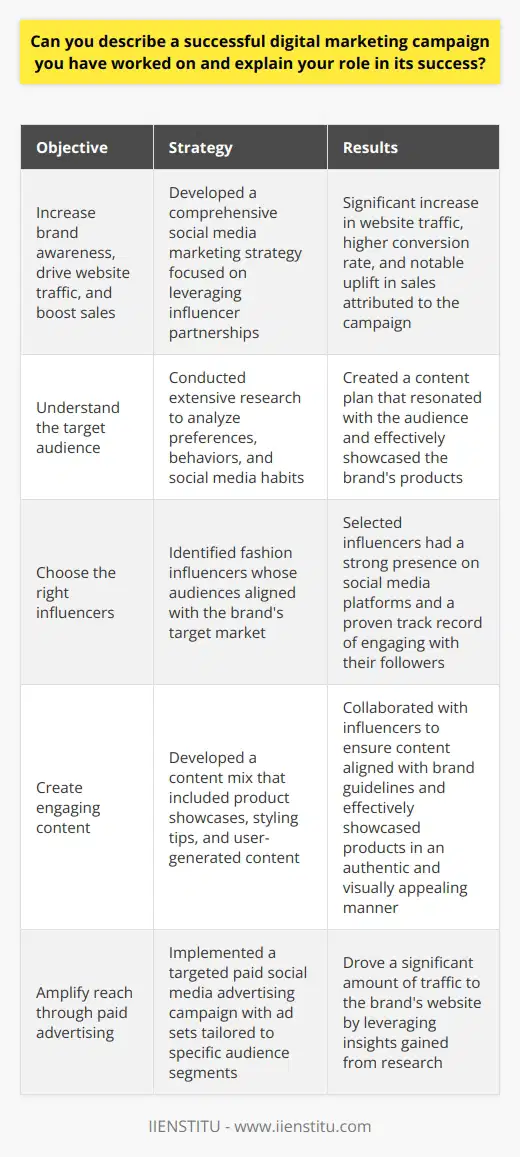
What is your level of expertise in digital marketing?
Digital marketing is a vast and constantly evolving field that requires a diverse set of skills and knowledge. My level of expertise in digital marketing is based on several years of practical experience, continuous learning, and staying updated with the latest trends and best practices in the industry.
Foundational Knowledge and Skills
I have a strong foundation in the core concepts of digital marketing, including search engine optimization (SEO), pay-per-click (PPC) advertising, social media marketing, content marketing, and email marketing. I understand the importance of targeting the right audience, creating compelling content, and measuring the success of campaigns through key performance indicators (KPIs).
Practical Experience
Over the years, I have worked on numerous digital marketing projects, ranging from small-scale campaigns to large, multi-channel initiatives. This hands-on experience has allowed me to develop a keen understanding of how to strategize, implement, and optimize digital marketing efforts to achieve desired outcomes, such as increased website traffic, lead generation, and conversions.
Specialization and Areas of Expertise
While I have a broad understanding of various digital marketing disciplines, I have developed specialized expertise in certain areas. For example, I have extensive experience in SEO, focusing on on-page optimization, keyword research, and link building strategies. Additionally, I have a strong track record in social media marketing, particularly in developing engaging content and managing paid advertising campaigns on platforms like Facebook, Instagram, and LinkedIn.
Continuous Learning and Adaptability
The digital marketing landscape is constantly changing, with new technologies, platforms, and best practices emerging regularly. To maintain my expertise, I make a concerted effort to stay informed about the latest developments in the field. I regularly attend industry conferences, participate in online courses, and engage with professional communities to expand my knowledge and skills.
Analytical and Data-Driven Approach
A critical aspect of my expertise in digital marketing is my ability to analyze and interpret data. I am well-versed in using analytics tools, such as Google Analytics, to monitor campaign performance, identify trends, and make data-driven decisions to optimize marketing strategies. By combining creativity with a data-driven approach, I can develop effective campaigns that deliver measurable results.
Collaboration and Leadership
Digital marketing often involves working with cross-functional teams, including designers, developers, and content creators. My expertise extends to effectively collaborating with these teams, communicating goals and strategies, and providing guidance and leadership to ensure the success of marketing initiatives. I have experience managing projects, delegating tasks, and fostering a positive and productive team environment.
Conclusion
In summary, my level of expertise in digital marketing is the result of a combination of foundational knowledge, practical experience, specialized skills, continuous learning, and a data-driven approach. I am confident in my ability to develop and execute effective digital marketing strategies that drive business growth and achieve measurable results.
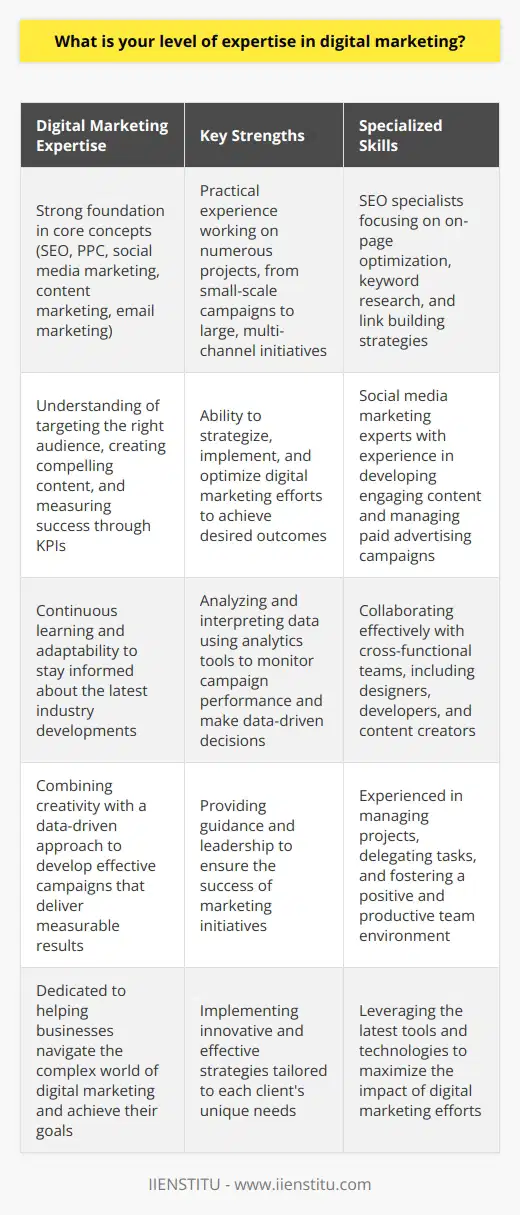
How would you rate your knowledge of digital marketing on a scale of 1 to 10?
Digital marketing knowledge is a valuable asset in today's business world. On a scale of 1 to 10, I would rate my knowledge of digital marketing as a 7. I have a solid understanding of the fundamental concepts and strategies involved in digital marketing, such as search engine optimization (SEO), social media marketing, email marketing, and content marketing. I have applied these strategies in various projects and have seen positive results.
Continuous Learning
However, I recognize that digital marketing is a constantly evolving field. New technologies, platforms, and best practices emerge regularly. To stay competitive, I must continuously update my knowledge and skills. I actively seek out educational resources, such as online courses, webinars, and industry blogs, to stay informed about the latest trends and techniques in digital marketing.
Practical Experience
While I have a strong theoretical foundation, I acknowledge that there is always room for improvement in terms of practical experience. I am eager to take on more digital marketing projects to apply my knowledge in real-world scenarios. Through hands-on experience, I can refine my skills, learn from successes and failures, and develop a more comprehensive understanding of what works and what doesn't in various industries and target markets.
Specialization Areas
Digital marketing encompasses a wide range of sub-disciplines, each with its own set of best practices and nuances. While I have a general understanding of most areas, I recognize that I have more expertise in some than others. For example, I am particularly strong in SEO and content marketing, but I am still developing my skills in paid advertising and analytics.
Collaboration and Learning from Others
I believe that collaboration is key to expanding my digital marketing knowledge. I actively seek out opportunities to work with and learn from more experienced professionals in the field. By collaborating on projects, attending industry events, and participating in online communities, I can gain valuable insights, stay up-to-date with best practices, and learn from the successes and challenges of others.
Continuous Improvement
As I continue to grow in my digital marketing career, I am committed to continuous improvement. I set goals for myself to expand my knowledge and skills in specific areas, such as mastering a new analytics tool or becoming proficient in a new social media platform. By setting measurable objectives and tracking my progress, I can ensure that I am consistently growing and improving as a digital marketer.
In conclusion, while I have a strong foundation in digital marketing, I recognize that there is always more to learn in this dynamic field. By continuously updating my knowledge, gaining practical experience, collaborating with others, and setting goals for improvement, I am confident that I can increase my expertise and provide even greater value to my clients and employers.
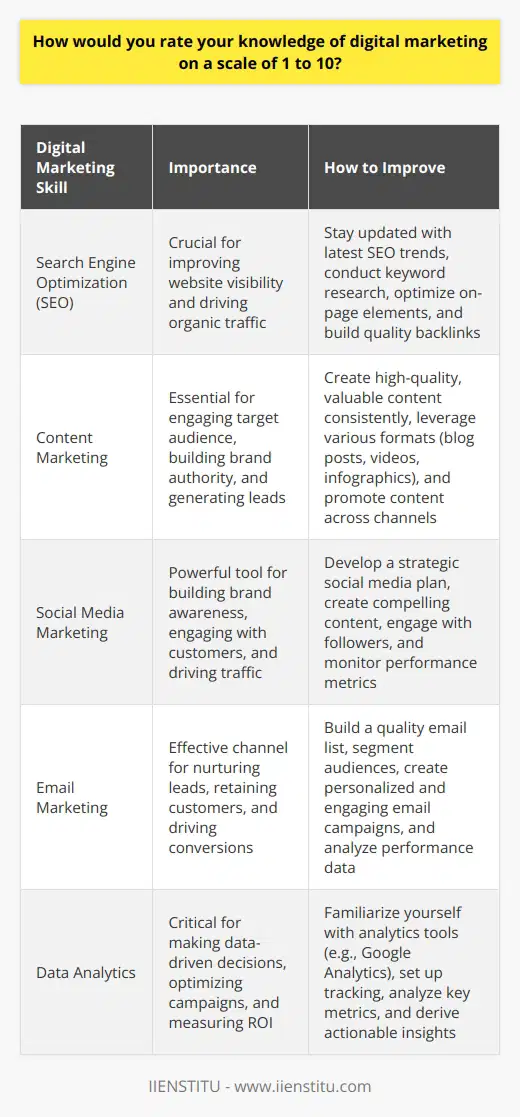
Can you provide examples that demonstrate your proficiency in digital marketing?
Digital marketing proficiency can be demonstrated through various examples that showcase one's skills and experience in the field. These examples may include successful campaigns, certifications, and the ability to utilize digital marketing tools effectively. Let's explore some specific instances that highlight digital marketing expertise.
Successful Digital Marketing Campaigns
A strong indicator of digital marketing proficiency is the ability to plan, execute, and analyze successful campaigns. For instance, a marketer may have developed a social media campaign that significantly increased brand awareness and engagement. They could have utilized targeted ads, influencer partnerships, and compelling content to achieve these goals. The success of such campaigns demonstrates a deep understanding of digital marketing strategies and the ability to adapt to different platforms and audiences.
Certifications and Courses
Completing relevant certifications and courses is another way to demonstrate digital marketing proficiency. Platforms like Google Analytics, HubSpot, and Facebook offer certification programs that cover various aspects of digital marketing. These certifications show a commitment to learning and staying up-to-date with industry best practices. They also provide a foundation of knowledge that can be applied to real-world scenarios.
Proficiency in Digital Marketing Tools
Digital marketing involves the use of various tools and platforms to analyze data, create content, and manage campaigns. Proficiency in these tools is essential for success in the field. For example, a marketer may be skilled in using Google Analytics to track website traffic, user behavior, and conversion rates. They may also be adept at using social media management tools like Hootsuite or Sprout Social to schedule posts, monitor engagement, and respond to customer inquiries.
Content Creation and Optimization
Creating engaging and optimized content is a crucial aspect of digital marketing. A proficient marketer should be able to write compelling copy, design eye-catching visuals, and optimize content for search engines. They may have experience in creating blog posts, infographics, videos, or other types of content that resonate with their target audience. Additionally, they should be familiar with SEO best practices and be able to conduct keyword research to improve content visibility and rankings.
Data Analysis and Reporting
Digital marketing proficiency also involves the ability to analyze data and provide meaningful insights. A skilled marketer should be comfortable working with data from various sources, such as website analytics, social media metrics, and advertising platforms. They should be able to interpret this data to identify trends, measure campaign effectiveness, and make data-driven decisions. Creating clear and concise reports that communicate key findings and recommendations to stakeholders is also an important skill.
Adaptability and Continuous Learning
The digital marketing landscape is constantly evolving, with new technologies, platforms, and trends emerging regularly. A proficient marketer should be adaptable and willing to continuously learn and update their skills. They may attend industry conferences, participate in online courses, or engage in self-directed learning to stay ahead of the curve. The ability to quickly grasp new concepts and apply them to marketing strategies is a valuable trait in the fast-paced world of digital marketing.
In conclusion, digital marketing proficiency can be demonstrated through a combination of successful campaigns, certifications, tool proficiency, content creation skills, data analysis abilities, and a commitment to continuous learning. By showcasing these examples, a marketer can effectively communicate their expertise and value to potential employers or clients.
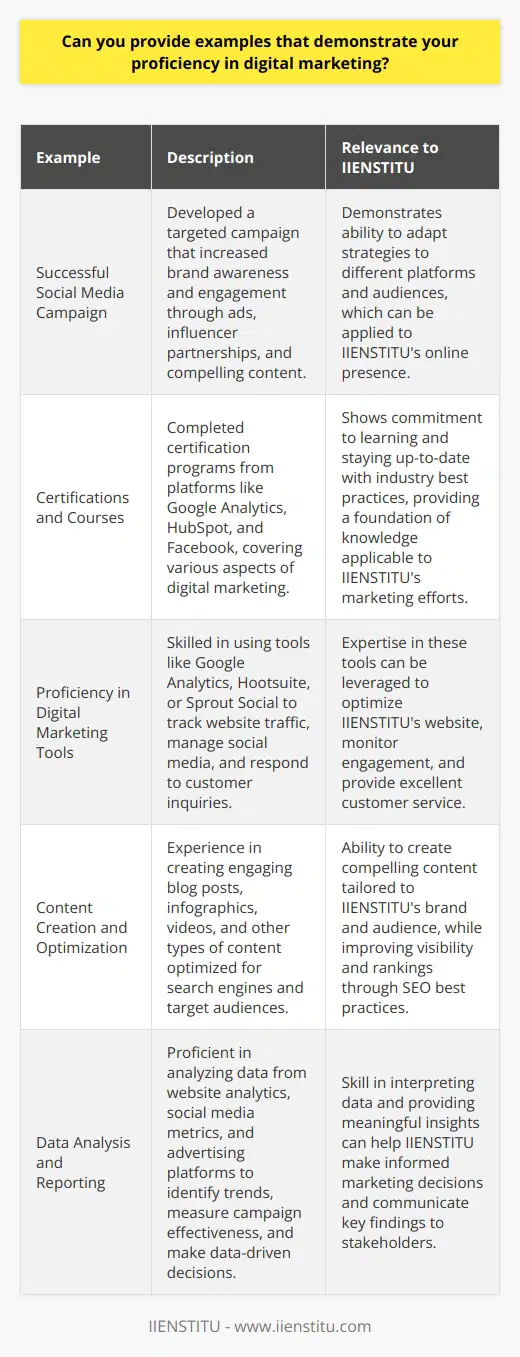
What are the key components of a successful digital marketing strategy?
A successful digital marketing strategy encompasses several key components that work together to achieve business objectives. These components include a well-defined target audience, clear goals and objectives, and a comprehensive plan for reaching and engaging with customers through various digital channels. Let's explore each of these components in more detail.
Identifying Your Target Audience
The foundation of any successful digital marketing strategy is a deep understanding of your target audience. This involves researching and analyzing customer demographics, preferences, behaviors, and pain points. By creating detailed buyer personas, you can tailor your marketing efforts to effectively reach and resonate with your ideal customers.
Conducting Market Research
To gain insights into your target audience, conduct thorough market research. Use surveys, focus groups, and analytics tools to gather data on customer preferences, behaviors, and trends. This information will help you make informed decisions about your marketing strategies and tactics.
Analyzing Customer Data
Utilize customer data from various sources, such as website analytics, social media metrics, and customer relationship management (CRM) systems. Analyze this data to identify patterns, preferences, and opportunities for improvement in your marketing efforts.
Setting Clear Goals and Objectives
A successful digital marketing strategy requires clear, measurable goals and objectives. These goals should align with your overall business objectives and be specific, achievable, and time-bound. Examples of digital marketing goals include increasing website traffic, generating leads, improving conversion rates, and enhancing brand awareness.
Defining Key Performance Indicators (KPIs)
Establish key performance indicators (KPIs) to track and measure the success of your digital marketing efforts. KPIs can include metrics such as website traffic, engagement rates, lead generation, and conversion rates. Regularly monitor and analyze these KPIs to assess the effectiveness of your strategies and make data-driven decisions.
Developing a Comprehensive Digital Marketing Plan
A comprehensive digital marketing plan outlines the strategies and tactics you will employ to achieve your goals. This plan should include a mix of digital channels and tactics, such as content marketing, search engine optimization (SEO), pay-per-click (PPC) advertising, social media marketing, and email marketing.
Content Marketing
Develop a content marketing strategy that focuses on creating valuable, informative, and engaging content tailored to your target audience. This can include blog posts, videos, infographics, and eBooks. Consistently publish and promote high-quality content to attract and retain customers.
Search Engine Optimization (SEO)
Optimize your website and content for search engines to improve organic visibility and drive qualified traffic. Conduct keyword research, optimize on-page elements, build high-quality backlinks, and ensure your website is mobile-friendly and has a fast loading speed.
Pay-Per-Click (PPC) Advertising
Leverage PPC advertising platforms, such as Google Ads and social media advertising, to reach your target audience and drive targeted traffic to your website. Create compelling ad copy, landing pages, and calls-to-action to maximize conversions.
Social Media Marketing
Develop a strong presence on relevant social media platforms where your target audience is active. Create and share engaging content, interact with followers, and run targeted social media advertising campaigns to build brand awareness and drive engagement.
Email Marketing
Build an email subscriber list and create targeted email marketing campaigns to nurture leads, promote products or services, and build customer loyalty. Segment your email list based on customer preferences and behaviors to deliver personalized and relevant content.
Measuring and Analyzing Results
Continuously monitor and analyze the performance of your digital marketing efforts using web analytics tools and marketing platforms. Regularly review your KPIs and make data-driven decisions to optimize your strategies and tactics. Conduct A/B testing to identify the most effective elements of your campaigns and make improvements accordingly.
By incorporating these key components into your digital marketing strategy, you can effectively reach and engage your target audience, achieve your business goals, and drive sustainable growth in the digital landscape.
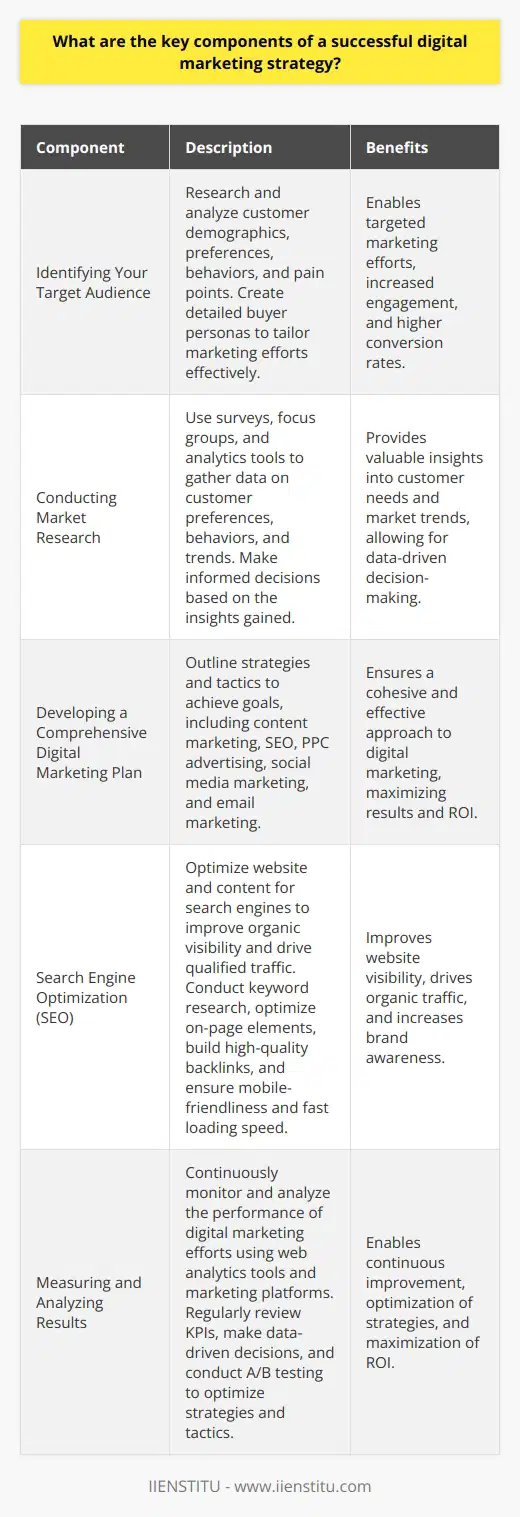
How do you measure the effectiveness of a digital marketing campaign?
Measuring the effectiveness of a digital marketing campaign is crucial for determining its success and making informed decisions. Several key performance indicators (KPIs) can be used to assess the impact of a campaign.
Website Traffic
One important metric is website traffic, which indicates the number of visitors to a site. Tools like Google Analytics can track the sources of traffic, such as organic search, paid ads, or social media. An increase in traffic from the targeted sources suggests a successful campaign.
Conversion Rates
Conversion rates measure the percentage of visitors who take a desired action, like making a purchase or filling out a form. A high conversion rate indicates that the campaign effectively persuades visitors to engage with the brand.
Cost per Acquisition (CPA)
CPA calculates the average cost of acquiring a new customer through the campaign. Divide the total campaign spend by the number of conversions to determine the CPA. A lower CPA suggests a more cost-effective campaign.
Return on Investment (ROI)
ROI compares the revenue generated by the campaign to its cost. Divide the net profit by the total campaign spend and multiply by 100 to calculate the ROI percentage. A positive ROI indicates that the campaign is profitable.
Engagement Metrics
Engagement metrics, such as likes, shares, comments, and click-through rates (CTR), measure how actively the audience interacts with the campaign content. High engagement suggests that the content resonates with the target audience.
Brand Awareness
Brand awareness can be measured through surveys, social media mentions, or search volume for brand-related keywords. An increase in brand awareness indicates that the campaign is effectively reaching and impacting the target audience.
A/B Testing
A/B testing compares two versions of a campaign element, like an ad or landing page, to determine which performs better. This helps optimize the campaign for better results.
To measure the effectiveness of a digital marketing campaign, set clear goals and track relevant KPIs. Regularly analyze the data to identify areas for improvement and optimize the campaign accordingly. By monitoring these metrics, marketers can make data-driven decisions to enhance the campaign's performance and achieve their objectives.
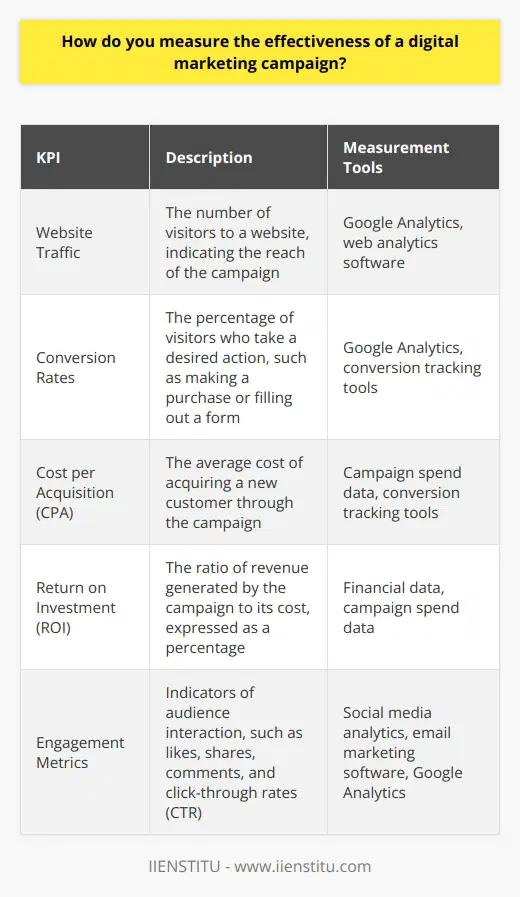
Can you explain the difference between SEO and SEM in the context of digital marketing?
SEO (Search Engine Optimization) and SEM (Search Engine Marketing) are two essential components of digital marketing. While both aim to increase a website's visibility and traffic, they differ in their approach and tactics.
Search Engine Optimization (SEO)
SEO focuses on improving a website's organic ranking on search engine results pages (SERPs). This is achieved through various techniques, such as keyword research, content optimization, and link building. The goal is to make a website more attractive to search engines, thereby increasing its visibility and organic traffic.
On-page SEO
On-page SEO involves optimizing individual web pages to rank higher in search results. This includes optimizing content, titles, meta descriptions, and URLs for targeted keywords. Additionally, it involves improving the website's structure, navigation, and loading speed to enhance user experience.
Off-page SEO
Off-page SEO refers to activities performed outside of a website to improve its search engine rankings. The most important off-page SEO factor is link building, which involves acquiring high-quality backlinks from other reputable websites. This helps establish a website's authority and relevance in its niche.
Search Engine Marketing (SEM)
SEM, on the other hand, is a paid advertising strategy that involves placing ads on search engines. The most common form of SEM is pay-per-click (PPC) advertising, where advertisers pay each time a user clicks on their ad.
Pay-Per-Click (PPC) Advertising
PPC ads appear at the top of search engine results pages, above organic listings. Advertisers bid on keywords relevant to their products or services, and their ads are displayed when users search for those keywords. The cost of each click depends on the competition for the targeted keywords.
Advantages of SEM
SEM offers several advantages over SEO, such as immediate visibility, targeted advertising, and measurable results. With SEM, businesses can quickly gain exposure to their target audience and drive targeted traffic to their website. Additionally, SEM campaigns provide detailed performance metrics, allowing advertisers to optimize their campaigns for better results.
Integrating SEO and SEM
While SEO and SEM differ in their approach, they can be used together for a comprehensive digital marketing strategy. SEO provides long-term, sustainable growth in organic traffic, while SEM offers immediate visibility and targeted advertising. By combining both strategies, businesses can maximize their online presence and reach their target audience more effectively.
Balancing SEO and SEM Efforts
The balance between SEO and SEM efforts depends on various factors, such as a business's goals, budget, and industry. For new websites or those in highly competitive niches, SEM can provide a much-needed boost in visibility and traffic. As the website gains traction and improves its organic rankings, the focus can shift towards SEO for long-term success.
Conclusion
In summary, SEO and SEM are two distinct but complementary aspects of digital marketing. SEO focuses on improving a website's organic visibility, while SEM involves paid advertising on search engines. By understanding the differences between SEO and SEM and leveraging their strengths, businesses can develop a comprehensive digital marketing strategy to achieve their goals and succeed online.
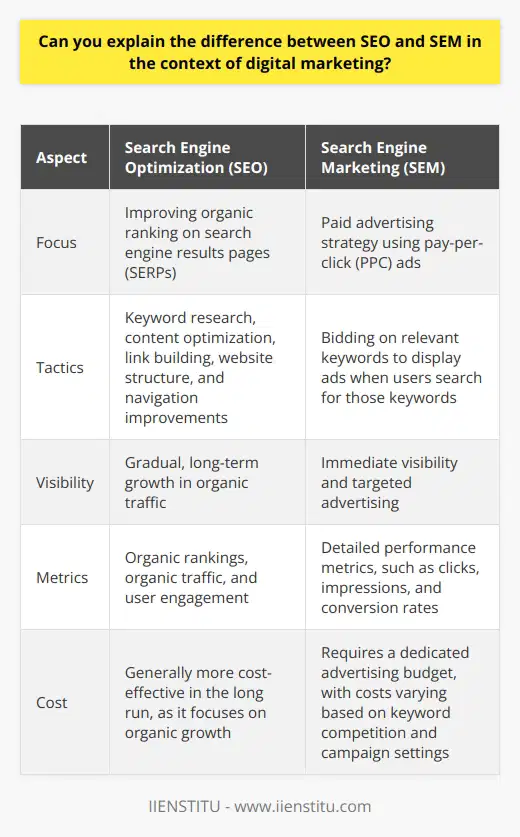
What are the most common digital marketing interview questions?
Digital marketing interviews often cover a range of topics to assess a candidate's knowledge and experience in the field. Some of the most common questions revolve around the candidate's familiarity with various digital marketing channels and strategies. Interviewers may ask about the candidate's experience with search engine optimization (SEO), pay-per-click (PPC) advertising, social media marketing, email marketing, and content marketing. They may also inquire about the candidate's ability to analyze and interpret data from web analytics tools like Google Analytics.
Understanding of Marketing Funnel and Customer Journey
Interviewers often ask candidates to demonstrate their understanding of the marketing funnel and customer journey. They may ask the candidate to explain how they would develop and implement a digital marketing strategy that effectively guides potential customers through the awareness, consideration, and decision stages of the funnel. This includes questions about how the candidate would create and distribute content that resonates with the target audience at each stage of the journey.
Experience with Digital Marketing Tools and Platforms
Digital marketing interviews also commonly include questions about the candidate's experience with various digital marketing tools and platforms. This may include questions about the candidate's proficiency with email marketing platforms like Mailchimp or Constant Contact, social media management tools like Hootsuite or Sprout Social, and PPC advertising platforms like Google Ads or Facebook Ads. Interviewers may also ask about the candidate's experience with marketing automation tools like HubSpot or Marketo.
Ability to Measure and Optimize Campaign Performance
Another common area of focus in digital marketing interviews is the candidate's ability to measure and optimize campaign performance. Interviewers may ask the candidate to describe how they would set up and track key performance indicators (KPIs) for a digital marketing campaign, and how they would use data to optimize the campaign for better results. They may also ask the candidate to provide examples of successful campaigns they have run in the past and to explain how they measured and optimized their performance.
Knowledge of Digital Marketing Trends and Best Practices
Finally, digital marketing interviews often include questions that assess the candidate's knowledge of current digital marketing trends and best practices. This may include questions about the candidate's understanding of emerging technologies like artificial intelligence and machine learning, as well as their familiarity with best practices for creating and distributing content across various digital channels. Interviewers may also ask the candidate to discuss their approach to staying up-to-date with the latest developments in the field.
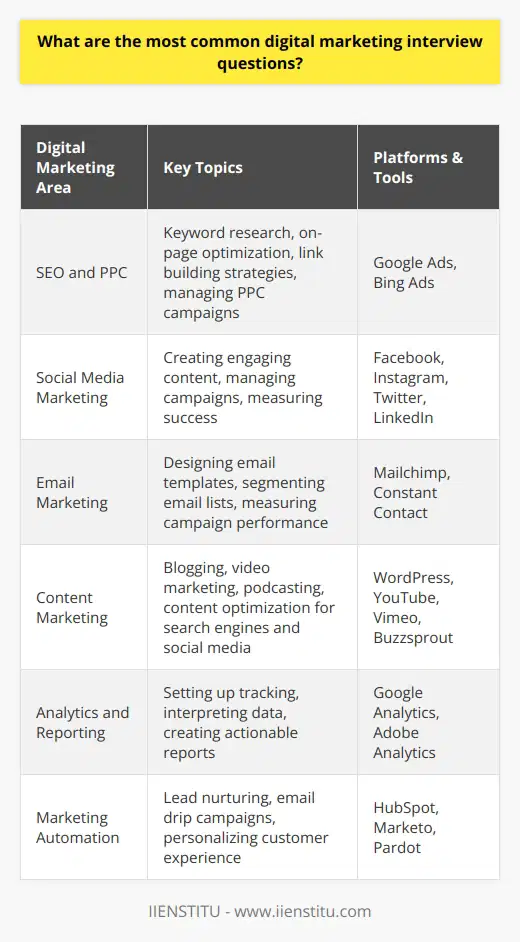
How can I prepare for a digital marketing interview?
To prepare for a digital marketing interview, you should focus on several key areas. First, research the company and its products or services. This will help you understand their target audience and marketing strategies. Additionally, review your own digital marketing experience and be ready to discuss specific campaigns or projects you have worked on.
Brush Up on Digital Marketing Concepts
Before the interview, refresh your knowledge of essential digital marketing concepts. This includes SEO, PPC, social media marketing, email marketing, and content marketing. Be prepared to explain how these strategies work together to achieve marketing goals. You should also be familiar with common digital marketing tools and platforms, such as Google Analytics and AdWords.
Prepare Examples and Case Studies
During the interview, you may be asked to provide examples of successful digital marketing campaigns you have worked on. Choose a few examples that highlight your skills and experience. Be ready to discuss the goals of each campaign, the strategies you used, and the results you achieved. Use data and metrics to support your examples whenever possible.
Demonstrate Your Analytical Skills
Digital marketing relies heavily on data analysis to measure the success of campaigns and make informed decisions. Showcase your analytical skills by discussing how you have used data to optimize campaigns or improve ROI. Highlight your experience with A/B testing, data visualization, and other analytical techniques.
Show Your Creativity and Problem-Solving Abilities
In addition to technical skills, digital marketers need to be creative and innovative. Be prepared to discuss how you have used creative strategies to engage audiences or solve marketing challenges. Highlight your ability to think outside the box and develop unique solutions to problems.
Research Industry Trends and Best Practices
To stand out in the interview, demonstrate your knowledge of current digital marketing trends and best practices. Read industry blogs, attend webinars, and follow thought leaders on social media to stay up-to-date. Be prepared to discuss how you would apply these trends and best practices to the company's marketing efforts.
Practice Your Communication Skills
Effective communication is essential for digital marketers. Practice articulating your thoughts clearly and concisely. Be prepared to explain technical concepts in simple terms and discuss how digital marketing strategies align with business goals. Consider practicing your interview skills with a friend or colleague to build your confidence.
By following these tips and dedicating time to preparation, you can increase your chances of success in a digital marketing interview. Remember to highlight your unique skills and experiences, and demonstrate your passion for the field.

Where can I find a comprehensive digital marketing interview questions and answers PDF?
Finding a comprehensive digital marketing interview questions and answers PDF can be challenging, but several resources are available. One effective approach is to search for digital marketing interview guides on reputable websites and online learning platforms. These guides often compile common interview questions and provide detailed answers to help candidates prepare effectively. Additionally, many digital marketing professionals and industry experts share their knowledge through blog posts and articles, offering valuable insights into the interview process.
Leveraging Online Learning Platforms
Online learning platforms like Coursera, Udemy, and LinkedIn Learning offer a wide range of digital marketing courses. These courses frequently include interview preparation materials, such as PDFs with sample questions and answers. By enrolling in a digital marketing course, you can access these resources and gain a deeper understanding of the subject matter. The course instructors, who are often industry professionals, share their expertise and provide guidance on how to excel in interviews.
Searching for Digital Marketing Interview Guides
Another approach is to search for digital marketing interview guides on search engines like Google. Use specific keywords such as "digital marketing interview questions and answers PDF" or "digital marketing interview preparation guide." This search will yield a variety of results, including blog posts, articles, and downloadable PDFs. Take the time to review multiple sources to ensure you have a comprehensive understanding of the common interview questions and appropriate answers.
Consulting Digital Marketing Blogs and Websites
Digital marketing blogs and websites are excellent resources for finding interview questions and answers. Many industry experts and experienced professionals share their knowledge through blog posts and articles. They often provide insights into the interview process, including the types of questions to expect and how to formulate effective responses. Some popular digital marketing blogs and websites to explore include Moz, HubSpot, and Search Engine Journal.
Engaging with Digital Marketing Communities
Engaging with digital marketing communities can also be beneficial in your search for interview resources. Online forums, social media groups, and professional networks like LinkedIn provide platforms for digital marketers to connect and share knowledge. Participating in discussions and seeking advice from experienced professionals can help you gather valuable insights and discover recommended resources for interview preparation. Don't hesitate to ask questions and seek guidance from the community members.
Remember, while a comprehensive digital marketing interview questions and answers PDF can be a useful resource, it's essential to understand the concepts thoroughly. Take the time to study the material, practice articulating your responses, and apply the knowledge to real-world scenarios. By combining the information from PDFs with hands-on experience and a deep understanding of digital marketing principles, you'll be well-prepared to tackle any interview question that comes your way.
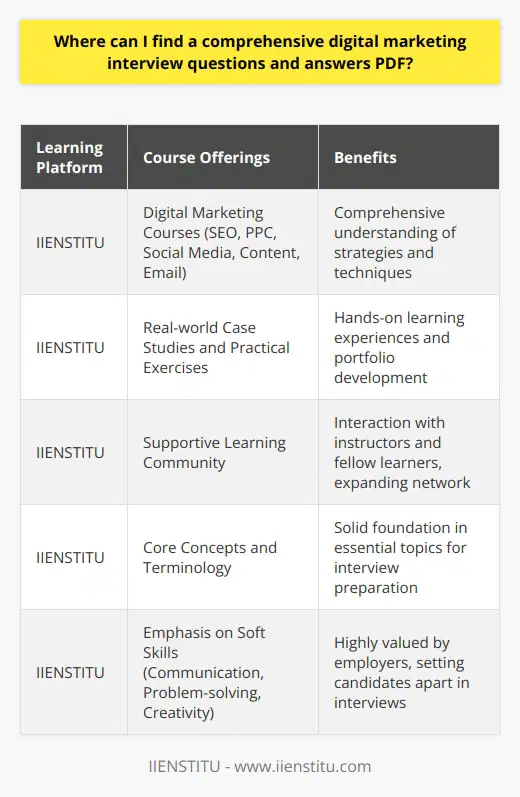
Why do you want to pursue a career in digital marketing?
Digital marketing has emerged as a dynamic and rapidly growing field that offers numerous opportunities for career growth and development. The ever-increasing reliance on digital technologies and the internet has transformed the way businesses operate and interact with their customers. Pursuing a career in digital marketing allows individuals to be at the forefront of this digital revolution and make a significant impact on the success of organizations.
Diverse and Exciting Opportunities
One of the primary reasons for choosing a career in digital marketing is the diverse range of opportunities it offers. Digital marketing encompasses various specializations, such as search engine optimization (SEO), social media marketing, content marketing, email marketing, and pay-per-click (PPC) advertising. This diversity allows individuals to explore different areas and find a niche that aligns with their interests and skills.
Moreover, the digital marketing landscape is constantly evolving, with new technologies and platforms emerging regularly. This dynamic nature of the field ensures that digital marketers are always learning and adapting to stay ahead of the curve. It provides a stimulating and exciting work environment where creativity, innovation, and strategic thinking are highly valued.
Measurable Impact and Results
Another compelling aspect of digital marketing is the ability to measure and quantify the impact of marketing efforts. Unlike traditional marketing methods, digital marketing provides a wealth of data and analytics that allow marketers to track the performance of their campaigns in real-time. This data-driven approach enables digital marketers to make informed decisions, optimize their strategies, and demonstrate the return on investment (ROI) to stakeholders.
The measurability of digital marketing campaigns is particularly valuable for businesses as it helps them allocate their marketing budgets effectively and justify their investments. Digital marketers can use various tools and platforms to monitor key metrics such as website traffic, conversion rates, engagement levels, and customer acquisition costs. This ability to measure and analyze results provides a sense of accomplishment and satisfaction, knowing that one's efforts are directly contributing to the success of a business.
Continuous Learning and Skill Development
Pursuing a career in digital marketing also offers abundant opportunities for continuous learning and skill development. The digital landscape is constantly evolving, with new technologies, platforms, and best practices emerging regularly. To stay competitive and deliver effective marketing strategies, digital marketers must commit to ongoing learning and professional development.
The digital marketing community is vibrant and supportive, with numerous resources available for learning and networking. From online courses and certifications to industry conferences and workshops, there are ample opportunities to acquire new skills, stay updated with the latest trends, and connect with like-minded professionals. This continuous learning process not only enhances one's expertise but also opens doors to new career opportunities and advancement.
Flexibility and Work-Life Balance
Digital marketing also offers the potential for a flexible work environment and a better work-life balance. With the increasing adoption of remote work and digital collaboration tools, many digital marketing roles can be performed from anywhere with an internet connection. This flexibility allows individuals to have more control over their schedules and work arrangements, enabling them to balance their professional and personal lives effectively.
Furthermore, the global nature of digital marketing means that there are opportunities to work with clients and teams from different parts of the world. This exposure to diverse cultures and perspectives can be enriching and contribute to personal and professional growth.
Conclusion
In conclusion, pursuing a career in digital marketing offers a multitude of benefits and opportunities. From the diverse range of specializations and the ability to make a measurable impact to the continuous learning opportunities and flexibility, digital marketing presents an exciting and rewarding career path. As businesses continue to prioritize their digital presence and customer engagement, the demand for skilled digital marketers is expected to grow exponentially. By embracing the challenges and opportunities that digital marketing presents, individuals can build a fulfilling and successful career in this dynamic field.
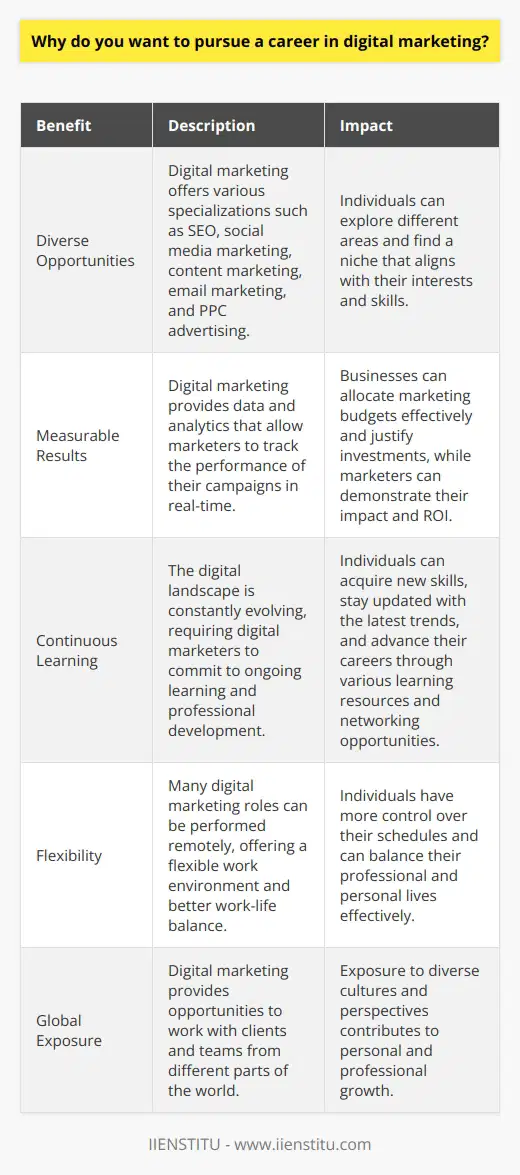
What aspects of digital marketing do you find most appealing and why?
Digital marketing has become an essential aspect of modern business, offering numerous advantages over traditional marketing methods. One of the most appealing aspects of digital marketing is its ability to reach a wide audience with minimal effort. Through various online platforms, such as social media, email, and search engines, businesses can connect with potential customers from all over the world. This global reach allows companies to expand their customer base and increase brand awareness, ultimately leading to higher sales and revenue.
Targeted Advertising
Another appealing aspect of digital marketing is its capacity for targeted advertising. Digital marketing tools allow businesses to collect and analyze data about their target audience, including their interests, behaviors, and preferences. This information enables marketers to create personalized campaigns that resonate with specific groups of people, increasing the likelihood of engagement and conversion. By delivering relevant content to the right people at the right time, companies can optimize their marketing efforts and achieve better results.
Cost-Effectiveness
Digital marketing is also highly cost-effective compared to traditional marketing methods. Online platforms offer various pricing models, such as pay-per-click (PPC) and cost-per-impression (CPI), which allow businesses to control their advertising expenses. This flexibility enables companies to allocate their marketing budget more efficiently, focusing on channels that generate the best return on investment (ROI). Additionally, digital marketing campaigns can be easily monitored and adjusted in real-time, ensuring that resources are not wasted on ineffective strategies.
Measurable Results
The ability to measure and track the performance of digital marketing campaigns is another appealing aspect. Digital marketing platforms provide detailed analytics and metrics, allowing businesses to evaluate the success of their efforts. Marketers can track various key performance indicators (KPIs), such as website traffic, click-through rates (CTR), conversion rates, and customer engagement. This data-driven approach enables companies to make informed decisions, optimize their strategies, and continuously improve their marketing performance.
Increased Engagement and Interactivity
Digital marketing also offers opportunities for increased engagement and interactivity with customers. Social media platforms, in particular, allow businesses to establish two-way communication with their audience. By responding to comments, messages, and reviews, companies can build strong relationships with their customers, fostering trust and loyalty. Furthermore, interactive content, such as polls, quizzes, and contests, can encourage customer participation and generate valuable user-generated content (UGC), which can be used to enhance brand credibility and reach.
Adaptability and Flexibility
The dynamic nature of digital marketing is another appealing aspect. As new technologies and platforms emerge, digital marketing strategies can be quickly adapted to leverage these opportunities. This adaptability allows businesses to stay ahead of the curve and remain competitive in an ever-changing digital landscape. Moreover, digital marketing campaigns can be easily modified and optimized based on real-time data and feedback, ensuring that companies can respond swiftly to changing market conditions and customer needs.
Conclusion
In conclusion, digital marketing offers numerous appealing aspects that make it an essential tool for modern businesses. Its global reach, targeted advertising capabilities, cost-effectiveness, measurable results, increased engagement, and adaptability provide companies with unparalleled opportunities to connect with their target audience and achieve their marketing goals. As the digital landscape continues to evolve, embracing digital marketing strategies will be crucial for businesses to remain competitive and thrive in the future.
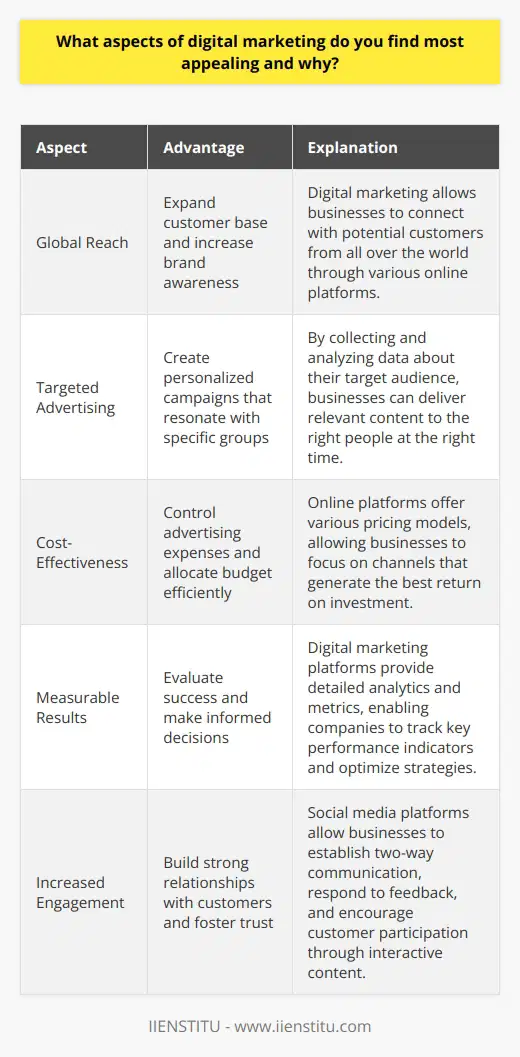
How do you believe your skills and experience make you a strong candidate for a role in digital marketing?
I believe my skills and experience make me a strong candidate for a role in digital marketing. My educational background in marketing and my practical experience in social media management have equipped me with a solid foundation in the field. I have developed a keen understanding of digital marketing strategies and techniques through my coursework and self-directed learning.
Proficiency in Digital Marketing Tools
I am proficient in using various digital marketing tools such as Google Analytics, Google Ads, and social media advertising platforms. I have hands-on experience in setting up and managing campaigns, analyzing data, and optimizing performance. My ability to leverage these tools effectively allows me to make data-driven decisions and achieve marketing goals.
Content Creation and Copywriting Skills
Creating engaging and compelling content is one of my strengths. I have excellent copywriting skills and can craft persuasive messages that resonate with the target audience. I understand the importance of storytelling and can develop content strategies that align with brand values and marketing objectives.
Social Media Management Expertise
I have a proven track record of successfully managing social media accounts for various brands. I am well-versed in creating and curating content, engaging with followers, and building online communities. My experience in social media management has taught me the importance of consistency, responsiveness, and adaptability in the ever-changing digital landscape.
Analytical and Problem-Solving Skills
I possess strong analytical and problem-solving skills, which are crucial in digital marketing. I can interpret data, identify trends, and derive meaningful insights to inform marketing strategies. I am adept at troubleshooting issues and finding creative solutions to challenges that arise in digital marketing campaigns.
Continuous Learning and Adaptability
The digital marketing industry is constantly evolving, and I am committed to staying up-to-date with the latest trends and best practices. I actively seek opportunities to enhance my knowledge and skills through attending workshops, webinars, and industry events. My adaptability allows me to quickly learn and implement new technologies and strategies to stay ahead of the curve.
Collaboration and Communication Skills
I am a strong collaborator and communicator, able to work effectively in cross-functional teams. I can clearly articulate ideas, provide constructive feedback, and build positive relationships with colleagues and stakeholders. My ability to work well with others and communicate effectively is essential for success in a digital marketing role.
In conclusion, my combination of skills, experience, and personal qualities make me a strong candidate for a digital marketing position. I am confident in my ability to contribute to the success of a digital marketing team and drive meaningful results for the organization.
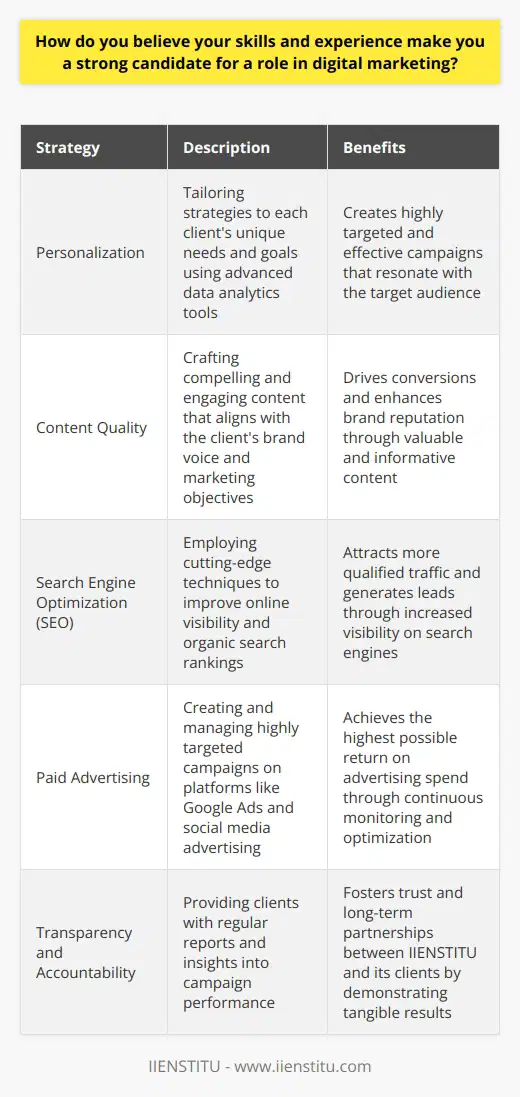
What are the main channels used in digital marketing?
Digital marketing encompasses various channels that businesses use to reach and engage their target audience effectively. These channels allow marketers to deliver tailored messages and content to potential customers. The main channels used in digital marketing include search engine optimization (SEO), pay-per-click (PPC) advertising, social media marketing, email marketing, content marketing, and mobile marketing.
Search Engine Optimization (SEO)
SEO involves optimizing a website to rank higher in search engine results pages (SERPs) for relevant keywords. By improving a website's visibility in search results, businesses can attract more organic traffic to their site. SEO techniques include keyword research, on-page optimization, link building, and technical optimization.
Pay-Per-Click (PPC) Advertising
PPC advertising allows businesses to display ads on search engine results pages and other websites. Advertisers pay a fee each time a user clicks on their ad. The most popular PPC platform is Google Ads, which enables businesses to target specific keywords and demographics.
Social Media Marketing
Social media marketing involves promoting a brand and engaging with customers on social media platforms like Facebook, Instagram, and Twitter. Businesses can create organic posts, run paid advertisements, and interact with their followers to build brand awareness and loyalty.
Organic Social Media Marketing
Organic social media marketing focuses on creating and sharing content that resonates with a brand's target audience. This approach aims to build a community of engaged followers who are interested in the brand's offerings.
Paid Social Media Advertising
Paid social media advertising allows businesses to reach a larger audience beyond their organic followers. Platforms like Facebook and Instagram offer sophisticated targeting options, enabling marketers to deliver ads to specific demographics, interests, and behaviors.
Email Marketing
Email marketing involves sending promotional messages, newsletters, and updates to a list of subscribers via email. This channel allows businesses to nurture leads, build relationships with customers, and drive conversions. Effective email marketing campaigns rely on segmentation, personalization, and compelling content.
Content Marketing
Content marketing focuses on creating and distributing valuable, relevant, and consistent content to attract and retain a target audience. This content can take various forms, such as blog posts, videos, infographics, and eBooks. The goal is to establish a brand as a thought leader and build trust with potential customers.
Mobile Marketing
Mobile marketing targets users on mobile devices, such as smartphones and tablets. This channel includes mobile-friendly websites, SMS marketing, mobile apps, and mobile advertising. With the increasing use of mobile devices, businesses must optimize their digital marketing efforts for mobile to reach their target audience effectively.
Mobile-Friendly Websites
A mobile-friendly website is designed to provide a seamless user experience on smaller screens. It should have a responsive design, fast loading times, and easy navigation.
SMS Marketing
SMS marketing involves sending promotional messages or updates to customers via text messages. This channel can be effective for time-sensitive offers or updates.
Mobile Apps
Mobile apps provide businesses with an opportunity to engage with customers on a more personal level. Apps can offer exclusive content, personalized recommendations, and push notifications to keep users engaged.
Mobile Advertising
Mobile advertising includes display ads, video ads, and native ads that appear on mobile websites and apps. Advertisers can target users based on their location, interests, and behaviors.
By leveraging these digital marketing channels, businesses can reach their target audience more effectively and efficiently. The key is to develop a comprehensive digital marketing strategy that integrates multiple channels to achieve specific business goals.
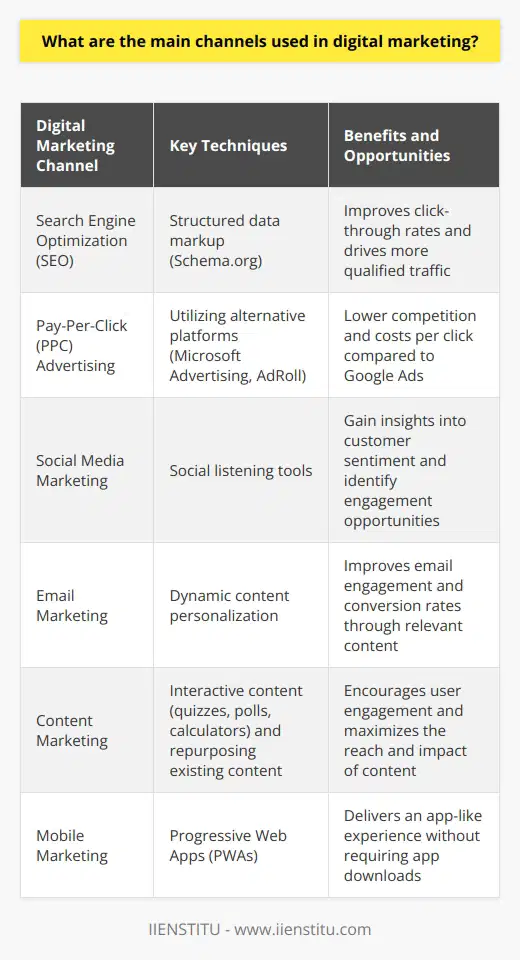
What metrics are commonly used to measure the success of digital marketing efforts?
Digital marketing success is measured through various metrics that provide insights into the effectiveness of marketing efforts. These metrics help businesses understand how well their digital marketing campaigns are performing and identify areas for improvement. Let's explore some of the commonly used metrics in digital marketing.
Website Traffic
Website traffic is a fundamental metric that measures the number of visitors to a website. This metric helps businesses gauge the popularity and visibility of their website. Tools like Google Analytics track website traffic, providing data on the number of unique visitors, page views, and average time spent on the site.
Sources of Traffic
Analyzing the sources of website traffic is crucial for understanding how visitors discover the website. Traffic sources can include organic search, paid advertising, social media, referral links, and direct traffic. This information helps businesses optimize their marketing efforts and allocate resources effectively.
Conversion Rate
Conversion rate measures the percentage of website visitors who take a desired action, such as making a purchase, filling out a form, or subscribing to a newsletter. It is a critical metric that indicates the effectiveness of a website in converting visitors into customers. A high conversion rate suggests that the website is well-designed, user-friendly, and effectively communicates the value proposition.
Conversion Funnel Analysis
The conversion funnel represents the journey a visitor takes from initial contact to becoming a customer. Analyzing the conversion funnel helps identify any bottlenecks or drop-off points where visitors are abandoning the website. This analysis enables businesses to optimize the user experience and improve conversion rates at each stage of the funnel.
Engagement Metrics
Engagement metrics measure how actively visitors interact with a website or digital marketing content. These metrics include bounce rate, time on site, pages per session, and social media engagement. A high engagement rate indicates that visitors find the content valuable and relevant, leading to increased brand loyalty and potential conversions.
Social Media Metrics
Social media metrics gauge the success of a business's social media presence and campaigns. These metrics include followers, likes, shares, comments, and click-through rates. Tracking social media metrics helps businesses understand their audience's preferences, measure the reach and impact of their content, and adjust their social media strategy accordingly.
Return on Investment (ROI)
ROI measures the financial return generated from digital marketing investments. It compares the revenue or profits generated from marketing efforts to the costs incurred. Calculating ROI helps businesses evaluate the profitability and efficiency of their digital marketing campaigns, allowing them to make data-driven decisions for future investments.
Customer Acquisition Cost (CAC)
CAC measures the average cost of acquiring a new customer through digital marketing efforts. It takes into account all the expenses associated with marketing, such as advertising spend, salaries, and tools. Monitoring CAC helps businesses optimize their marketing budget and ensure that they are acquiring customers at a sustainable cost.
Customer Lifetime Value (CLV)
CLV represents the total revenue a business can expect to generate from a single customer throughout their relationship with the brand. It takes into account factors like average order value, purchase frequency, and customer retention rate. Understanding CLV helps businesses make informed decisions about customer acquisition, retention, and upselling strategies.
By tracking these metrics, businesses can gain valuable insights into the performance of their digital marketing efforts. Regular monitoring and analysis of these metrics enable data-driven decision-making, optimization of marketing strategies, and ultimately, the achievement of business goals.
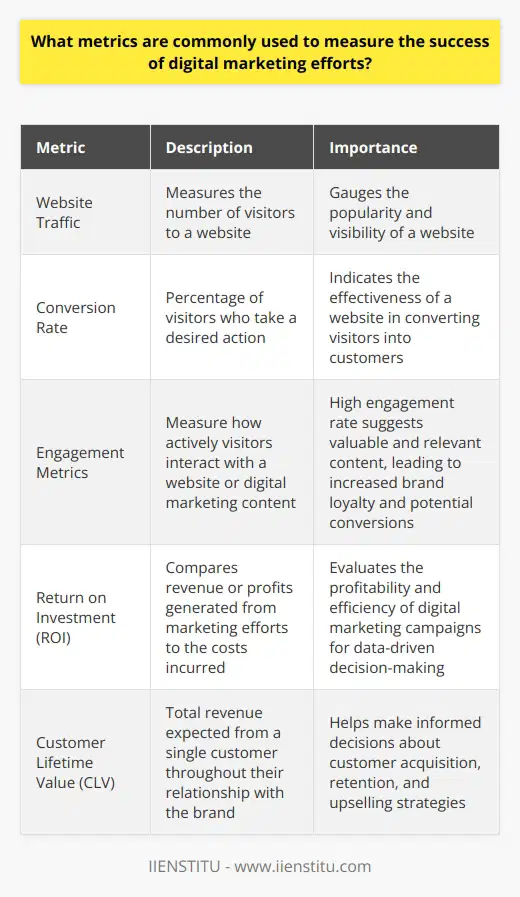
What are your most significant strengths and weaknesses, and how do they relate to your professional experience?
Self-awareness is crucial for personal and professional growth, as it allows individuals to capitalize on their strengths and address their weaknesses. Through introspection and feedback from others, I have identified my most significant strengths and weaknesses, which have shaped my professional experience and development.
Strengths
Adaptability
One of my primary strengths is my ability to adapt to new situations and challenges. I embrace change and quickly learn new skills, enabling me to thrive in dynamic work environments. This adaptability has allowed me to take on diverse roles and responsibilities throughout my career, contributing to my professional versatility and growth.
Communication Skills
Effective communication is another key strength of mine. I articulate ideas clearly and concisely, both verbally and in writing. This skill has been invaluable in collaborating with team members, presenting proposals to clients, and building strong professional relationships. My ability to listen actively and provide constructive feedback has enhanced teamwork and project outcomes.
Problem-Solving
I possess strong problem-solving skills, which enable me to analyze complex situations and develop creative solutions. I approach challenges methodically, breaking them down into manageable components and considering multiple perspectives. This strength has been instrumental in overcoming obstacles and driving innovation in my professional endeavors.
Weaknesses
Perfectionism
While my attention to detail is a strength, it can sometimes lead to perfectionism. I have a tendency to spend excessive time refining work, which can impact efficiency. Recognizing this weakness, I have actively worked on striking a balance between quality and timely delivery, prioritizing tasks and setting realistic expectations for myself and others.
Overcommitting
Another weakness I have identified is my inclination to take on too many responsibilities. Driven by my enthusiasm and desire to contribute, I sometimes overcommit myself, leading to stress and potential burnout. To address this, I have learned to prioritize tasks, delegate when appropriate, and communicate my limitations to maintain a healthy work-life balance.
Relating Strengths and Weaknesses to Professional Experience
My strengths and weaknesses have significantly influenced my professional experience. My adaptability has allowed me to navigate career transitions and take on new challenges with confidence. Strong communication skills have been vital in building relationships, collaborating effectively, and achieving shared goals. Problem-solving abilities have enabled me to tackle complex projects and contribute to organizational success.
Conversely, my perfectionism has sometimes led to prolonged project timelines and increased stress levels. Recognizing this, I have actively worked on managing expectations and focusing on the most critical aspects of each task. Overcommitting has occasionally strained my work-life balance, prompting me to develop better time management and delegation skills.
Conclusion
Understanding my strengths and weaknesses has been a transformative journey in my professional life. By leveraging my strengths and actively addressing my weaknesses, I have grown as an individual and contributed more effectively to my team and organization. Continuous self-reflection and a commitment to personal development have been key to aligning my strengths and weaknesses with my professional goals and aspirations.
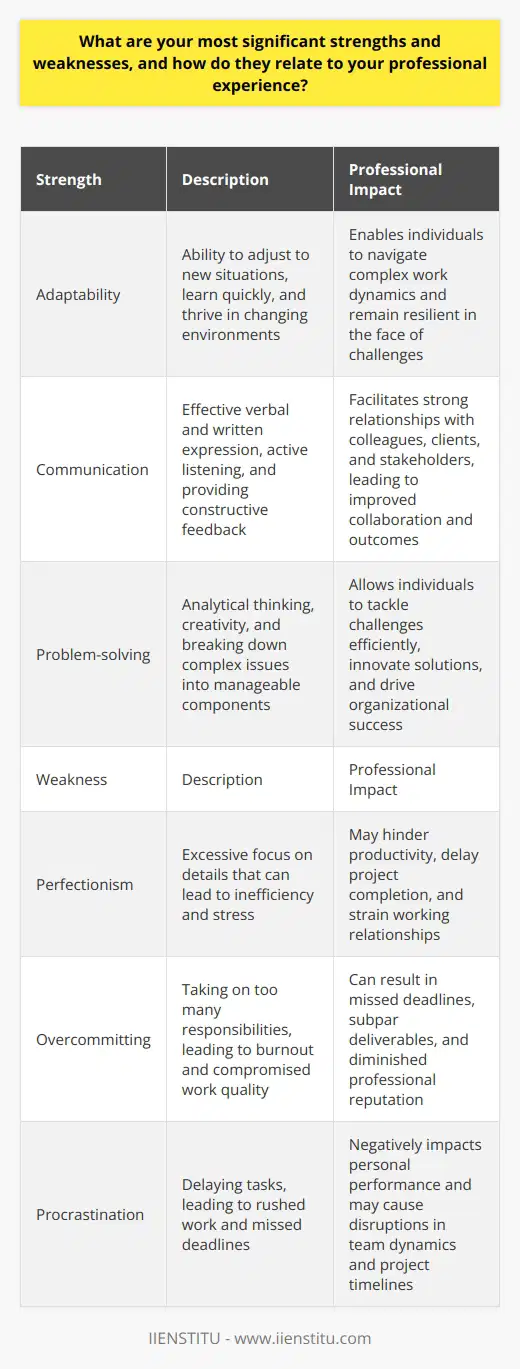
Can you describe a challenging digital marketing campaign you worked on and how you overcame the obstacles?
One of the most challenging digital marketing campaigns I worked on involved promoting a new software product. The target audience was highly technical and skeptical of marketing claims. To overcome this obstacle, we focused on creating content that demonstrated the product's capabilities and value proposition.
We produced a series of video tutorials and case studies showcasing how the software could solve specific problems. These assets were promoted through targeted social media ads and email campaigns. We also partnered with industry influencers to provide third-party validation and reach a wider audience.
Adapting to Change
Halfway through the campaign, we realized that our initial messaging wasn't resonating with the audience. We quickly pivoted our strategy and adjusted the content to address the audience's pain points more directly. This required close collaboration with the product team to ensure our messaging was accurate and relevant.
Leveraging Data
To measure the success of the campaign, we tracked various metrics such as engagement rates, lead generation, and conversion rates. We used this data to continuously optimize our targeting and messaging. By analyzing the data, we identified the most effective channels and content formats, allowing us to allocate resources more efficiently.
Building Trust
One of the key challenges was building trust with the target audience. We addressed this by showcasing customer testimonials and case studies that highlighted the real-world benefits of the software. We also participated in industry forums and online communities to engage with potential customers and address their concerns.
Collaborating with Sales
To ensure a smooth handoff from marketing to sales, we worked closely with the sales team to develop a lead nurturing strategy. We created targeted email sequences and provided the sales team with valuable insights about each lead's behavior and interests. This collaboration helped improve lead quality and conversion rates.
Achieving Results
Despite the challenges, the campaign was ultimately successful. We generated a significant number of qualified leads and achieved a high conversion rate. The success of the campaign was attributed to our ability to adapt to the audience's needs, leverage data-driven insights, and collaborate effectively with cross-functional teams.
Key Takeaways
Understand your target audience and address their pain points directly
Use data to optimize targeting and messaging continuously
Build trust through customer testimonials and engagement in industry communities
Collaborate with sales to ensure a smooth lead nurturing process
The experience taught me the importance of flexibility, data-driven decision making, and cross-functional collaboration in digital marketing. By staying agile and adapting to the audience's needs, we were able to overcome obstacles and deliver a successful campaign.
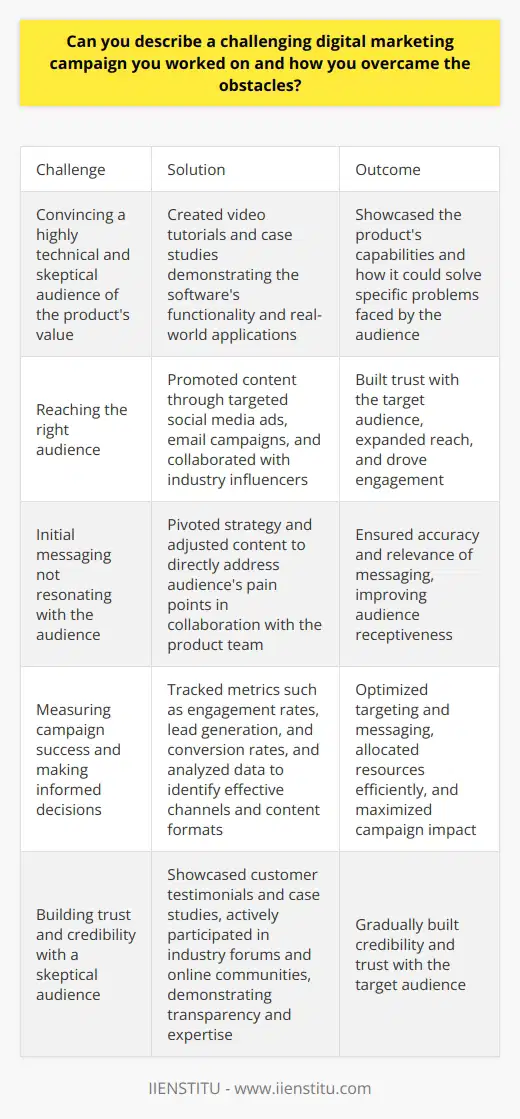
How do you stay up-to-date with the latest trends and best practices in the digital marketing industry?
Staying up-to-date with the latest trends and best practices in the digital marketing industry is crucial for success. Digital marketers must continually educate themselves to stay ahead of the curve in this rapidly evolving field. Several strategies can be employed to ensure one remains informed about the most current developments and techniques.
Attend Industry Conferences and Events
Participating in digital marketing conferences and events is an excellent way to stay informed about the latest trends. These gatherings provide opportunities to learn from industry experts, network with peers, and discover new tools and strategies. Many conferences offer workshops and seminars that delve into specific aspects of digital marketing, allowing attendees to gain in-depth knowledge.
Follow Influential Blogs and Publications
Numerous blogs and publications dedicate themselves to covering the latest developments in digital marketing. Following these sources regularly can help marketers stay informed about new trends, case studies, and best practices. Some notable publications include Search Engine Journal, Marketing Land, and Social Media Examiner. These outlets feature articles written by experienced professionals who share their insights and expertise.
Subscribe to Industry Newsletters
Many digital marketing companies and thought leaders offer newsletters that deliver the latest news and tips directly to subscribers' inboxes. Signing up for these newsletters is a convenient way to stay updated on industry developments without having to actively seek out information. Some popular newsletters include the Moz Top 10, HubSpot's Marketing Blog, and the Content Marketing Institute's newsletter.
Engage in Online Communities and Social Media
Participating in online communities and social media platforms dedicated to digital marketing is another effective way to stay current. Joining groups on LinkedIn, Facebook, and other platforms allows marketers to engage in discussions, ask questions, and learn from others' experiences. Twitter is also a valuable resource, as many industry experts share their thoughts and insights through tweets and threads.
Experiment with New Tools and Techniques
Hands-on experience is essential for staying up-to-date with the latest trends and best practices in digital marketing. Marketers should actively experiment with new tools and techniques to gain a practical understanding of their effectiveness. This approach allows marketers to determine which strategies work best for their specific needs and adapt their approaches accordingly.
Analyze Competitor Strategies
Studying the strategies employed by successful competitors can provide valuable insights into current trends and best practices. Marketers should regularly analyze their competitors' websites, social media presence, and advertising campaigns to identify effective techniques and areas for improvement. This competitive analysis can help inform decision-making and inspire new ideas.
Invest in Continuous Learning
Digital marketers should prioritize continuous learning to stay up-to-date with the latest trends and best practices. This can involve enrolling in online courses, attending workshops, or pursuing certifications. Many reputable organizations, such as Google, HubSpot, and Hootsuite, offer comprehensive training programs that cover various aspects of digital marketing. Investing time and resources into ongoing education is essential for long-term success in this dynamic field.
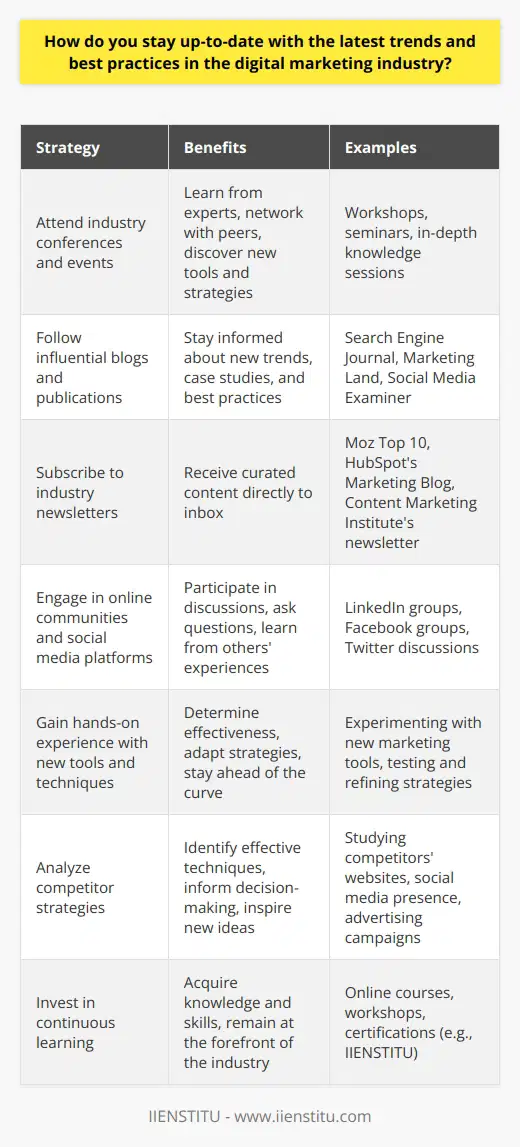
What are the key components of a successful digital marketing strategy?
A successful digital marketing strategy incorporates several key components that work together to achieve business goals. These components include a well-defined target audience, clear objectives, and a comprehensive plan for reaching and engaging potential customers. Effective strategies also involve a combination of tactics, such as search engine optimization (SEO), pay-per-click advertising (PPC), content marketing, social media marketing, and email marketing.
Understanding Your Target Audience
To create a successful digital marketing strategy, it is crucial to have a deep understanding of your target audience. This involves conducting thorough research to identify their demographics, interests, pain points, and online behaviors. By gaining insights into your target audience, you can tailor your marketing messages and tactics to effectively reach and resonate with them.
Defining Clear Objectives
A clear set of objectives is essential for guiding your digital marketing efforts and measuring success. These objectives should be specific, measurable, achievable, relevant, and time-bound (SMART). Examples of digital marketing objectives include increasing website traffic, generating leads, improving conversion rates, and building brand awareness.
Developing a Comprehensive Plan
A comprehensive digital marketing plan outlines the strategies and tactics you will use to achieve your objectives. This plan should include a mix of digital marketing channels and techniques that align with your target audience and goals. It should also establish a timeline, budget, and resources required for execution.
Implementing Key Tactics
To execute your digital marketing plan effectively, it is important to implement a range of key tactics:
Search Engine Optimization (SEO)
SEO involves optimizing your website and content to rank higher in search engine results pages (SERPs). By improving your search engine visibility, you can attract more qualified traffic to your site.
Pay-Per-Click Advertising (PPC)
PPC advertising allows you to place targeted ads on search engines and other websites. This tactic can help you reach your target audience quickly and drive immediate traffic to your site.
Content Marketing
Content marketing focuses on creating and distributing valuable, relevant, and consistent content to attract and retain a clearly defined audience. This can include blog posts, videos, infographics, and other engaging formats.
Social Media Marketing
Social media marketing involves promoting your brand and content on social media platforms to increase brand awareness, engage with your audience, and drive traffic to your website.
Email Marketing
Email marketing allows you to send targeted messages directly to your subscribers' inboxes. This tactic can help you build relationships, promote your products or services, and drive conversions.
Measuring and Analyzing Results
To determine the success of your digital marketing efforts, it is essential to measure and analyze your results regularly. This involves tracking key performance indicators (KPIs) such as website traffic, leads, conversions, and engagement rates. By monitoring these metrics, you can identify areas for improvement and optimize your strategy over time.
By incorporating these key components into your digital marketing strategy, you can effectively reach and engage your target audience, achieve your business objectives, and drive long-term success in the digital landscape.

How can a business effectively measure the ROI of their digital marketing efforts?
Measuring the ROI of digital marketing efforts is crucial for businesses to optimize their marketing strategies and allocate resources effectively. To accurately assess the ROI, companies should establish clear goals and key performance indicators (KPIs) aligned with their overall business objectives. These KPIs may include website traffic, lead generation, conversion rates, customer acquisition costs, and customer lifetime value.
Tracking and Analytics
Implementing comprehensive tracking and analytics tools is essential for gathering data on various digital marketing channels and campaigns. Google Analytics, for example, provides valuable insights into website traffic, user behavior, and conversion rates. Additionally, utilizing UTM parameters in marketing campaign URLs allows businesses to track the effectiveness of specific campaigns across different channels.
Attribution Modeling
Attribution modeling helps businesses understand the impact of each touchpoint in the customer journey. By assigning credit to different marketing channels and campaigns, companies can identify which efforts contribute most to conversions and revenue. Multi-touch attribution models, such as time-decay or position-based, provide a more comprehensive view of the customer journey compared to single-touch models like first-click or last-click attribution.
Customer Lifetime Value (CLV)
Calculating the CLV of customers acquired through digital marketing efforts is crucial for determining long-term ROI. By considering factors such as average order value, purchase frequency, and customer retention rate, businesses can estimate the total revenue a customer will generate over their lifetime. Comparing the CLV to the customer acquisition cost (CAC) helps determine the profitability of marketing campaigns.
A/B Testing and Optimization
Continuously testing and optimizing digital marketing campaigns is essential for improving ROI. A/B testing allows businesses to compare the performance of different campaign elements, such as ad copy, landing pages, or email subject lines. By identifying the most effective variations, companies can refine their marketing efforts and allocate resources to the highest-performing campaigns.
Regular Reporting and Analysis
Generating regular reports and conducting in-depth analysis of digital marketing performance is crucial for measuring ROI. These reports should include key metrics, trends, and insights derived from tracking and analytics data. By regularly reviewing and discussing these reports with stakeholders, businesses can make data-driven decisions to optimize their marketing strategies and improve overall ROI.
Integration with Sales and CRM Data
Integrating digital marketing data with sales and customer relationship management (CRM) systems provides a more comprehensive view of the customer journey. By connecting marketing efforts to actual sales and revenue data, businesses can better attribute conversions and calculate the true ROI of their digital marketing campaigns. This integration also helps identify opportunities for improvement in the sales process and customer retention strategies.
In conclusion, effectively measuring the ROI of digital marketing efforts requires a holistic approach that encompasses goal setting, tracking, attribution modeling, customer lifetime value calculation, continuous optimization, regular reporting, and integration with sales and CRM data. By implementing these strategies and leveraging the right tools and analytics, businesses can make data-driven decisions to optimize their digital marketing efforts and maximize their return on investment.
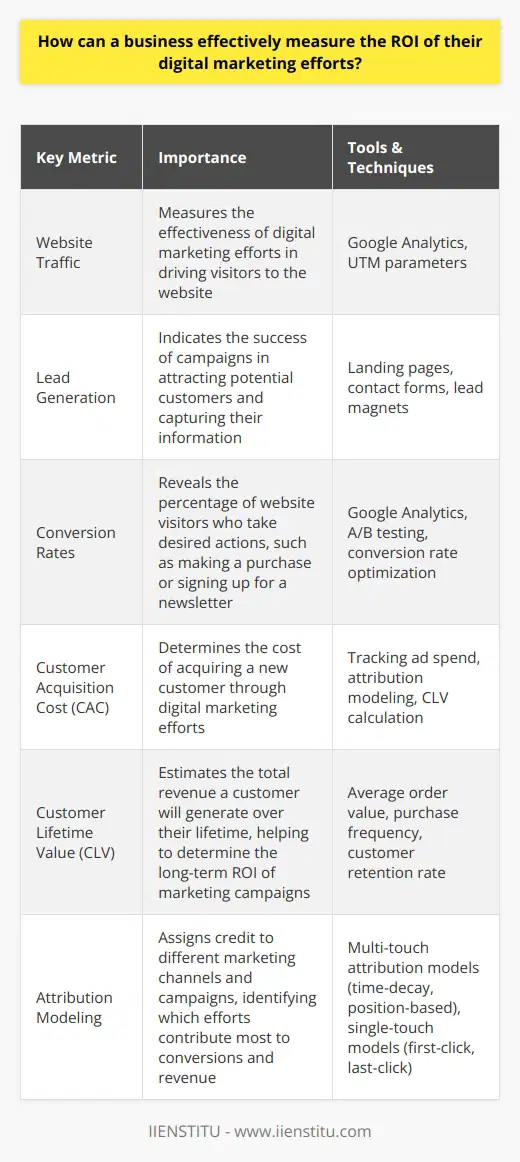
What are some common challenges faced by companies when implementing a digital marketing interview assignment?
Companies face several challenges when implementing a digital marketing interview assignment. One significant challenge is defining clear objectives and expectations for the assignment. Without a well-defined scope, candidates may struggle to understand what is required of them, leading to subpar submissions. Additionally, creating an assignment that accurately assesses a candidate's skills and knowledge within the limited time frame of an interview process can be difficult.
Technical Limitations
Another common challenge is ensuring that the assignment is technically feasible for all candidates. Not every candidate may have access to the necessary tools, software, or resources to complete the assignment effectively. This can create an unfair advantage for some candidates and may not provide an accurate assessment of their abilities. Furthermore, technical glitches or compatibility issues during the assignment can cause frustration and hinder the candidate's performance.
Time Constraints
Time constraints are another significant challenge when implementing a digital marketing interview assignment. Candidates often have limited time to complete the assignment, which can be stressful and may not allow them to showcase their full potential. Moreover, reviewing and evaluating the assignments can be time-consuming for the hiring team, especially if there are numerous candidates. Balancing the need for a comprehensive assignment with the available time and resources can be a tricky task.
Maintaining Fairness and Consistency
Ensuring fairness and consistency throughout the assignment process is crucial but can be challenging. All candidates should receive the same instructions, resources, and time limits to maintain a level playing field. Inconsistencies in the assignment or evaluation criteria can lead to biased results and may not provide an accurate comparison between candidates. Developing a standardized grading rubric and having multiple reviewers assess the assignments can help mitigate this challenge.
Protecting Intellectual Property
When implementing a digital marketing interview assignment, companies must also consider the protection of their intellectual property. Candidates may be exposed to sensitive information or data during the assignment, and ensuring that this information remains confidential can be a challenge. Companies must have proper non-disclosure agreements in place and carefully design the assignment to minimize the risk of information leaks or misuse.
Providing Meaningful Feedback
Providing constructive feedback to candidates after the assignment is essential for a positive candidate experience. However, offering detailed and personalized feedback to each candidate can be time-consuming, especially if there are many applicants. Striking a balance between providing meaningful feedback and managing time effectively can be a challenge for hiring teams. Developing a structured feedback process and allocating sufficient time for evaluation can help address this issue.
Conclusion
Implementing a digital marketing interview assignment comes with various challenges, including defining clear objectives, ensuring technical feasibility, managing time constraints, maintaining fairness and consistency, protecting intellectual property, and providing meaningful feedback. By addressing these challenges proactively and developing well-structured assignment processes, companies can effectively assess candidates' skills and make informed hiring decisions.
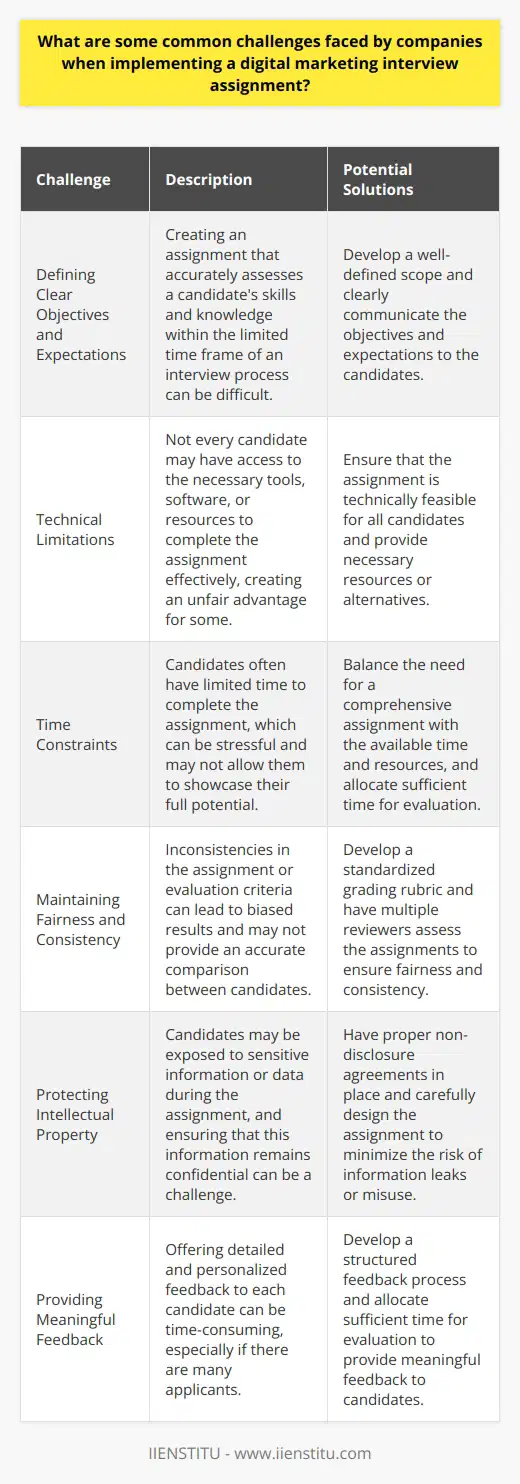
What is your level of proficiency in various digital marketing channels such as SEO, PPC, social media, and email marketing?
Digital marketing channels have become increasingly crucial for businesses to reach and engage with their target audience effectively. Search Engine Optimization (SEO), Pay-Per-Click (PPC) advertising, social media marketing, and email marketing are among the most prominent digital marketing channels. Proficiency in these channels is essential for digital marketers to develop and execute successful marketing strategies.
SEO Proficiency
SEO involves optimizing websites to rank higher in search engine results pages (SERPs) for relevant keywords. A proficient SEO marketer should have a deep understanding of search engine algorithms and best practices. They should be skilled in conducting keyword research, optimizing on-page elements, building quality backlinks, and analyzing website performance using tools like Google Analytics.
PPC Advertising Proficiency
PPC advertising allows businesses to display ads on search engines and other platforms, paying only when users click on them. A proficient PPC marketer should be able to create compelling ad copy, select relevant keywords, set appropriate bids, and optimize campaigns for better performance. They should also be familiar with platforms like Google Ads and Microsoft Advertising.
Social Media Marketing Proficiency
Social media marketing involves promoting a brand and engaging with its audience on social media platforms. A proficient social media marketer should have a deep understanding of various social media platforms, such as Facebook, Twitter, Instagram, and LinkedIn. They should be able to create engaging content, run social media advertising campaigns, and analyze social media metrics to measure success.
Email Marketing Proficiency
Email marketing involves sending promotional or informational messages to a list of email subscribers. A proficient email marketer should be able to create compelling email content, design visually appealing email templates, segment email lists for targeted messaging, and analyze email campaign performance. They should also be familiar with email marketing platforms like Mailchimp, Constant Contact, or HubSpot.
Continuous Learning and Adaptation
Digital marketing is a constantly evolving field, with new technologies and best practices emerging regularly. A proficient digital marketer should be committed to continuous learning and staying up-to-date with the latest trends and developments in the industry. They should be open to experimenting with new strategies and tools to improve their marketing efforts.
In conclusion, proficiency in digital marketing channels like SEO, PPC, social media, and email marketing is crucial for success in the digital marketing landscape. A proficient digital marketer should have a deep understanding of these channels, be skilled in executing strategies, and be committed to continuous learning and adaptation.
How do you stay updated with the latest trends and best practices in the ever-evolving digital marketing landscape?
Staying updated with the latest trends and best practices in digital marketing is crucial for success in this rapidly changing field. One effective method is to regularly read industry blogs and publications, such as Search Engine Journal, Marketing Land, and Social Media Examiner. These resources provide valuable insights into emerging trends, case studies, and expert opinions that can inform your marketing strategies.
Attending conferences and webinars is another excellent way to stay current with digital marketing trends. Events like Content Marketing World, MozCon, and Social Media Marketing World bring together industry leaders and practitioners to share their knowledge and experiences. These gatherings offer opportunities to learn from experts, network with peers, and gain exposure to cutting-edge ideas and techniques.
Engage with Industry Influencers
Following and engaging with industry influencers on social media platforms like Twitter and LinkedIn can also help you stay informed. Influencers often share their insights, opinions, and curated content related to digital marketing trends. By participating in discussions and asking questions, you can gain valuable knowledge and build relationships with thought leaders in the field.
Experiment and Analyze
Conducting your own experiments and analyzing the results is a hands-on approach to staying updated. Implementing new strategies, testing different tactics, and measuring their impact can provide valuable insights into what works best for your specific audience and goals. By continuously experimenting and refining your approach, you can stay ahead of the curve and adapt to changes in the digital landscape.
Join Professional Organizations
Joining professional organizations, such as the American Marketing Association (AMA) or the Digital Marketing Institute (DMI), can provide access to exclusive resources, training programs, and networking opportunities. These organizations often host events, webinars, and workshops that cover the latest trends and best practices in digital marketing. Membership also allows you to connect with other professionals and learn from their experiences.
Monitor Competitor Activities
Keeping an eye on your competitors' digital marketing activities can provide valuable insights into industry trends and successful strategies. Analyze their content, social media presence, and advertising campaigns to identify what works well in your niche. By studying your competitors, you can learn from their successes and mistakes, and adapt your own strategies accordingly.
Embrace Continuous Learning
Staying updated in digital marketing requires a commitment to continuous learning. Embrace a growth mindset and actively seek out opportunities to acquire new knowledge and skills. Consider enrolling in online courses, attending workshops, or pursuing certifications to deepen your understanding of specific areas of digital marketing, such as search engine optimization (SEO), pay-per-click advertising (PPC), or content marketing.
Collaborate with Peers
Collaborating with peers and colleagues in the digital marketing community can foster knowledge sharing and idea exchange. Participate in online forums, social media groups, or local meetups to connect with other professionals facing similar challenges. By engaging in discussions, sharing experiences, and seeking advice, you can learn from others and stay informed about the latest trends and best practices.
In conclusion, staying updated with the latest trends and best practices in digital marketing requires a proactive approach. By combining self-directed learning, engaging with industry resources, experimenting, and collaborating with peers, you can continuously expand your knowledge and adapt to the ever-evolving digital landscape. Embracing a lifelong learning mindset is essential for success in this dynamic field.
Can you provide examples of successful digital marketing campaigns you have led or contributed to, and what metrics did you use to measure their success?
I have led and contributed to several successful digital marketing campaigns throughout my career. One notable example was a social media campaign for a fashion e-commerce brand, where I developed a strategy to increase brand awareness and drive sales. The campaign involved collaborating with influencers, creating engaging content, and running targeted ads on platforms like Instagram and Facebook. To measure the success of the campaign, I tracked metrics such as reach, engagement rate, click-through rate, and conversion rate. The campaign resulted in a 30% increase in website traffic and a 15% increase in sales revenue within the first month.
Content Marketing Campaign for a B2B SaaS Company
Another successful campaign I spearheaded was a content marketing initiative for a B2B SaaS company. The goal was to establish the company as a thought leader in their industry and generate high-quality leads. I developed a content strategy that included creating blog posts, whitepapers, and webinars that addressed the pain points and challenges faced by the company's target audience. I also implemented an SEO strategy to improve the company's search engine rankings and drive organic traffic to their website. The success of the campaign was measured by tracking metrics such as organic traffic, lead generation, and conversion rates. Over a period of six months, the campaign generated a 50% increase in organic traffic and a 25% increase in lead generation.
Email Marketing Campaign for a Non-Profit Organization
I also contributed to a successful email marketing campaign for a non-profit organization. The objective was to increase donations and engage with the organization's supporters. I helped develop a series of email campaigns that included compelling storytelling, personalized content, and clear calls-to-action. The success of the campaign was measured by tracking metrics such as open rates, click-through rates, and donation amounts. The campaign resulted in a 20% increase in email open rates and a 10% increase in donations compared to the previous year.
Key Metrics for Measuring Digital Marketing Campaign Success
When measuring the success of digital marketing campaigns, I typically focus on the following key metrics:
Reach and impressions
Engagement rates (likes, comments, shares)
Click-through rates
Conversion rates
Lead generation
Sales revenue
Return on investment (ROI)
Continuous Optimization and Improvement
Throughout each campaign, I closely monitor these metrics and make data-driven decisions to optimize and improve the performance of the campaigns. This involves conducting A/B tests, refining targeting strategies, and adapting content based on audience feedback and behavior. By continuously iterating and refining the campaigns, I strive to maximize their impact and achieve the desired outcomes for the business or organization.
What is your level of expertise in digital marketing?
My level of expertise in digital marketing is extensive, encompassing various aspects of the field. I have acquired a comprehensive understanding of digital marketing strategies through years of experience and continuous learning. This expertise allows me to effectively plan, execute, and optimize digital marketing campaigns across multiple channels.
Proficiency in Digital Marketing Channels
I am proficient in utilizing a wide range of digital marketing channels to reach target audiences. These channels include search engine optimization (SEO), pay-per-click (PPC) advertising, social media marketing, email marketing, and content marketing. I understand the unique characteristics and best practices associated with each channel, enabling me to create integrated campaigns that maximize reach and engagement.
Search Engine Optimization (SEO)
In the realm of SEO, I possess a deep understanding of on-page and off-page optimization techniques. I am skilled in conducting keyword research, optimizing website structure and content, and building high-quality backlinks. By implementing effective SEO strategies, I help websites improve their organic search rankings and attract relevant traffic.
Pay-Per-Click (PPC) Advertising
I am well-versed in managing PPC campaigns across various platforms, such as Google Ads and social media advertising. I can create compelling ad copy, select appropriate targeting options, and optimize campaigns based on performance data. My expertise in PPC allows me to drive targeted traffic, generate leads, and maximize return on investment (ROI) for businesses.
Data Analysis and Optimization
A crucial aspect of my digital marketing expertise lies in data analysis and optimization. I am proficient in using analytics tools, such as Google Analytics, to track and interpret marketing campaign performance. By analyzing key metrics like traffic, engagement, and conversion rates, I can identify areas for improvement and make data-driven decisions to optimize campaigns for better results.
A/B Testing and Conversion Rate Optimization (CRO)
I have experience in conducting A/B tests to optimize various elements of digital marketing campaigns. By testing different versions of ad copy, landing pages, or email subject lines, I can determine which variations resonate best with the target audience. Additionally, I am skilled in implementing CRO techniques to improve website user experience and increase conversion rates.
Content Creation and Storytelling
My digital marketing expertise extends to content creation and storytelling. I understand the importance of creating engaging, informative, and shareable content that resonates with the target audience. I can develop content strategies that align with business goals and create compelling blog posts, articles, social media content, and other marketing collateral.
Visual Content and Multimedia
I recognize the power of visual content in capturing attention and conveying messages effectively. I am skilled in creating visually appealing graphics, infographics, and videos that enhance the impact of digital marketing campaigns. By leveraging multimedia, I can create immersive experiences that engage and inspire audiences.
In summary, my level of expertise in digital marketing is comprehensive and multifaceted. With a strong foundation in various digital marketing channels, data analysis, optimization techniques, content creation, and storytelling, I am well-equipped to develop and execute effective digital marketing strategies. This expertise allows me to drive measurable results and help businesses achieve their marketing goals in the digital landscape.
How would you rate your knowledge of digital marketing on a scale of 1 to 10?
Digital marketing is a vast and constantly evolving field that encompasses various strategies and techniques to promote products, services, and brands online. In today's digital age, having a solid understanding of digital marketing is crucial for businesses and individuals alike. When asked to rate my knowledge of digital marketing on a scale of 1 to 10, I would give myself a 7.
Understanding the Fundamentals
I have a strong grasp of the fundamental concepts and principles of digital marketing. I understand the importance of defining a target audience, setting clear objectives, and developing a comprehensive digital marketing strategy. I am well-versed in various digital marketing channels such as search engine optimization (SEO), pay-per-click advertising (PPC), social media marketing, email marketing, and content marketing.
Practical Experience
Throughout my career, I have gained practical experience in implementing digital marketing campaigns. I have worked on projects that involved keyword research, on-page optimization, and link building for SEO. I have also managed PPC campaigns on platforms like Google Ads and Facebook Ads, optimizing ad copy, targeting, and bidding strategies to achieve desired results.
Staying Up-to-Date
Digital marketing is a field that requires continuous learning and staying updated with the latest trends and best practices. I make a conscious effort to stay informed about the latest developments in digital marketing by attending industry conferences, webinars, and workshops. I regularly read blogs, articles, and case studies to learn from the experiences of other digital marketers and apply those insights to my own work.
Areas for Improvement
While I have a solid foundation in digital marketing, I acknowledge that there is always room for improvement. I am keen on deepening my knowledge in areas such as data analytics, conversion rate optimization, and marketing automation. I believe that mastering these skills will enable me to make data-driven decisions, optimize campaigns for better results, and streamline marketing processes.
Continuous Learning
I am committed to continuous learning and professional development in the field of digital marketing. I plan to pursue additional certifications, such as Google Analytics and HubSpot Inbound Marketing, to validate my skills and stay updated with the latest industry standards. I also intend to collaborate with experienced digital marketers and learn from their expertise to further enhance my knowledge and skills.
Conclusion
In conclusion, I would rate my knowledge of digital marketing as a 7 out of 10. I have a strong understanding of the fundamentals, practical experience in implementing campaigns, and a commitment to staying updated with the latest trends. However, I recognize that there is always room for improvement, and I am dedicated to continuous learning and professional development in this dynamic field.
Can you provide examples demonstrating your proficiency in digital marketing?
Digital marketing proficiency encompasses various aspects, including social media management, content creation, and data analysis. One notable example of my expertise lies in the successful execution of targeted social media campaigns. By leveraging platforms like Facebook and Instagram, I have effectively increased brand awareness and engagement for multiple clients. Through meticulous audience research and the creation of compelling content, these campaigns have generated substantial follower growth and conversions.
Content Marketing Strategies
Another area where I excel is content marketing. I have developed and implemented comprehensive content strategies that align with business objectives. This includes crafting blog posts, whitepapers, and email newsletters that educate, inform, and engage target audiences. By consistently delivering valuable content, I have helped businesses establish thought leadership and build trust with their customers. The success of these efforts is evident in the increased website traffic, lead generation, and customer loyalty.
Search Engine Optimization (SEO)
Search engine optimization (SEO) is a critical component of digital marketing, and I have demonstrated proficiency in this area. Through keyword research, on-page optimization, and link building strategies, I have improved the search engine rankings of numerous websites. By implementing best practices such as meta tag optimization, header tag hierarchy, and content optimization, I have helped businesses achieve higher visibility in organic search results. The impact of these efforts is reflected in the increased organic traffic and improved conversion rates.
Data Analysis and Reporting
Data-driven decision-making is essential in digital marketing, and I have showcased my skills in data analysis and reporting. Using tools like Google Analytics and Adobe Analytics, I have conducted in-depth analyses of website performance, user behavior, and marketing campaign effectiveness. By extracting meaningful insights from data, I have provided actionable recommendations to optimize marketing strategies. Regular reporting and data visualization have allowed stakeholders to track progress, identify areas for improvement, and make informed decisions.
Email Marketing Campaigns
Email marketing is another area where I have demonstrated proficiency. I have designed and executed targeted email campaigns that engage subscribers and drive conversions. By segmenting email lists based on user preferences and behavior, I have delivered personalized content that resonates with each recipient. Through A/B testing of subject lines, content, and calls-to-action, I have optimized email performance and achieved higher open rates, click-through rates, and conversion rates.
Continuous Learning and Adaptation
The digital marketing landscape is constantly evolving, and I have consistently demonstrated my ability to stay updated with the latest trends and technologies. I actively engage in continuous learning through attending industry conferences, participating in online courses, and staying connected with digital marketing communities. By adapting to new platforms, tools, and strategies, I have helped businesses stay ahead of the curve and maintain a competitive edge in the digital space.
These examples highlight my proficiency in various aspects of digital marketing. From social media campaigns to content creation, SEO to data analysis, I have consistently delivered results that drive business growth and success. My ability to combine creativity, technical skills, and strategic thinking has enabled me to excel in the dynamic field of digital marketing.
What are some of the most important metrics to track in a digital marketing campaign?
Digital marketing campaigns require careful monitoring and analysis to ensure their effectiveness and return on investment. Some of the most crucial metrics to track include website traffic, engagement rates, conversion rates, and customer acquisition costs. By closely examining these key performance indicators, marketers can gain valuable insights into the success of their campaigns and make data-driven decisions to optimize their strategies.
Website Traffic
Website traffic is a fundamental metric that measures the number of visitors to a site. It provides a clear indication of the reach and visibility of a digital marketing campaign. By analyzing traffic sources, such as organic search, social media, or paid advertising, marketers can identify which channels are most effective in driving visitors to their site.
Engagement Metrics
Engagement metrics, such as bounce rate, time on site, and pages per session, offer insights into how visitors interact with a website. A high bounce rate may suggest that the landing page is not relevant or engaging enough, while a long time on site and multiple pages per session indicate that visitors find the content valuable and are exploring the site further.
Conversion Rates
Conversion rates measure the percentage of visitors who take a desired action, such as making a purchase, filling out a form, or subscribing to a newsletter. This metric is crucial for assessing the effectiveness of a digital marketing campaign in achieving its goals. By tracking conversion rates, marketers can identify areas for improvement and optimize their strategies to drive more conversions.
Customer Acquisition Costs
Customer acquisition costs (CAC) represent the total cost of acquiring a new customer through a digital marketing campaign. This metric takes into account all the expenses associated with the campaign, such as advertising spend, content creation, and labor costs. By comparing the CAC to the lifetime value of a customer, marketers can determine the profitability and sustainability of their acquisition strategies.
Return on Investment
Return on investment (ROI) is a critical metric that measures the profitability of a digital marketing campaign. It compares the revenue generated by the campaign to the total cost of running it. A positive ROI indicates that the campaign is generating more revenue than it costs, while a negative ROI suggests that the campaign is not profitable and may need to be adjusted or discontinued.
Lead Generation and Nurturing
For businesses that rely on lead generation, tracking the number and quality of leads generated by a digital marketing campaign is essential. This metric can help marketers assess the effectiveness of their lead generation strategies and identify opportunities for improvement. Additionally, monitoring the progress of leads through the sales funnel and measuring the conversion rate of leads to customers can provide valuable insights into the success of lead nurturing efforts.
Social Media Metrics
Social media metrics, such as followers, likes, shares, and comments, can help marketers gauge the impact of their social media campaigns. These metrics provide insights into the level of engagement and reach of social media posts and can help identify which types of content resonate best with the target audience. By tracking social media metrics, marketers can refine their content strategy and improve the effectiveness of their social media marketing efforts.
In conclusion, tracking these essential metrics is crucial for the success of any digital marketing campaign. By regularly monitoring and analyzing these key performance indicators, marketers can make informed decisions, optimize their strategies, and ultimately achieve their marketing goals.
How do you stay up-to-date with the latest trends and best practices in digital marketing?
Staying up-to-date with the latest trends and best practices in digital marketing is crucial for success. One effective method is to regularly read industry blogs and publications. These resources provide valuable insights into emerging technologies, strategies, and case studies. Attending conferences and webinars is another excellent way to learn from experts and network with peers. Social media platforms, such as Twitter and LinkedIn, are also useful for following thought leaders and joining relevant discussions. Participating in online courses and workshops can help develop new skills and stay current with best practices. Additionally, experimenting with new tools and techniques allows for hands-on learning and innovation. By dedicating time to continuous learning, digital marketers can adapt to the ever-evolving landscape and drive better results.
Read Industry Blogs and Publications
Industry blogs and publications are essential resources for staying informed about the latest trends in digital marketing. These sources often feature articles written by experienced professionals who share their insights and expertise. By regularly reading these materials, marketers can gain a deeper understanding of emerging technologies, successful strategies, and real-world case studies. Some popular industry blogs include Search Engine Journal, Marketing Land, and Social Media Examiner. Additionally, publications such as AdWeek and eMarketer provide valuable data and analysis on various aspects of digital marketing. Incorporating these resources into a daily or weekly routine can help marketers stay current and make informed decisions.
Attend Conferences and Webinars
Attending conferences and webinars is another effective way to stay up-to-date with digital marketing trends and best practices. These events bring together industry experts, thought leaders, and professionals to share their knowledge and experiences. Conferences often feature keynote speeches, panel discussions, and workshops that cover a wide range of topics. They also provide opportunities for networking and learning from peers. Webinars, on the other hand, are online seminars that allow attendees to learn from the comfort of their own offices or homes. Many companies and organizations host webinars on various digital marketing subjects, making it easy to find relevant content. By participating in these events, marketers can gain new insights, learn about innovative strategies, and stay connected with the industry.
Leverage Social Media Platforms
Social media platforms, such as Twitter and LinkedIn, are valuable tools for staying up-to-date with digital marketing trends. These platforms allow marketers to follow thought leaders, join relevant discussions, and engage with their peers. On Twitter, marketers can use hashtags to find and participate in conversations about specific topics. They can also follow influential figures in the industry to learn from their insights and experiences. LinkedIn is another excellent platform for staying informed. It features various groups dedicated to digital marketing, where professionals can share articles, ask questions, and discuss best practices. By actively participating in these online communities, marketers can expand their knowledge and stay connected with the latest developments in the field.
Enroll in Online Courses and Workshops
Enrolling in online courses and workshops is an effective way to develop new skills and stay current with best practices. Many universities, organizations, and industry experts offer online learning opportunities that cover various aspects of digital marketing. These courses often provide structured curricula, practical assignments, and interactive discussions with instructors and peers. Platforms like Coursera, Udemy, and HubSpot Academy offer a wide range of courses on topics such as social media marketing, search engine optimization, and content creation. By dedicating time to these learning experiences, marketers can deepen their understanding of specific areas and apply new knowledge to their work.
Experiment with New Tools and Techniques
Experimenting with new tools and techniques is another valuable approach to staying up-to-date with digital marketing trends. The industry is constantly evolving, with new technologies and platforms emerging regularly. By actively seeking out and testing these innovations, marketers can gain hands-on experience and identify opportunities for improvement. This experimentation can involve trying out new social media features, exploring different ad formats, or implementing innovative content strategies. By embracing a mindset of continuous learning and experimentation, marketers can adapt to the changing landscape and find new ways to engage audiences and drive results.
Dedicate Time to Continuous Learning
Can you describe a successful digital marketing campaign you have worked on and the results it achieved?
One successful digital marketing campaign I worked on was for a B2B software company targeting enterprise clients. The campaign's objective was to generate high-quality leads and increase brand awareness within the target market. We developed a comprehensive content marketing strategy that included blog posts, whitepapers, and webinars.
Targeted Content Creation
We began by conducting thorough keyword research to identify the topics and phrases our target audience was searching for. Based on this research, we created a content calendar that addressed the pain points and challenges faced by our ideal customers. Each piece of content was crafted to provide valuable insights and actionable advice.
Our team of expert writers and industry thought leaders collaborated to produce high-quality, engaging content. We ensured that the content was optimized for search engines while maintaining a user-friendly and informative tone. The blog posts, whitepapers, and webinars were designed to showcase our company's expertise and build trust with potential clients.
Multi-Channel Promotion
To maximize the reach and impact of our content, we implemented a multi-channel promotion strategy. We shared the content across our social media profiles, including LinkedIn, Twitter, and Facebook. We also leveraged paid social media advertising to target specific demographics and job titles within our ideal customer profile.
Additionally, we conducted email marketing campaigns to nurture leads and keep our brand top-of-mind. We segmented our email list based on user behavior and interests, allowing us to deliver personalized content recommendations. We also partnered with industry influencers and relevant websites to secure guest blogging opportunities and expand our reach.
Results and ROI
The results of the digital marketing campaign were impressive. Over a period of six months, we achieved:
A 150% increase in website traffic, with a significant portion coming from organic search
A 75% increase in lead generation, with a higher percentage of qualified leads
An improvement in search engine rankings for key industry keywords
A 30% increase in social media followers and engagement
A 20% conversion rate on our gated whitepapers and webinars
The campaign generated a significant return on investment for the company. The high-quality leads we attracted resulted in several large enterprise deals, contributing to a substantial increase in revenue. The increased brand awareness also positioned our company as a thought leader in the industry.
Continuous Optimization
Throughout the campaign, we continuously monitored and analyzed key performance indicators. We used data-driven insights to optimize our content strategy, ad targeting, and email campaigns. By iteratively refining our approach based on real-time data, we were able to maximize the impact of our efforts.
The success of this digital marketing campaign demonstrates the power of a well-executed content marketing strategy. By creating valuable, targeted content and promoting it through multiple channels, we were able to attract and engage our ideal customers effectively.
What are the most common digital marketing interview questions asked by employers?
Digital marketing interview questions asked by employers often revolve around the candidate's knowledge, experience, and problem-solving abilities. Employers seek to assess the applicant's understanding of various digital marketing channels, strategies, and tools. They may inquire about the candidate's familiarity with search engine optimization (SEO), pay-per-click (PPC) advertising, social media marketing, content marketing, and email marketing. Additionally, employers may ask about the candidate's experience with web analytics tools, such as Google Analytics, and their ability to interpret and utilize data to make informed decisions.
Assessing Knowledge and Experience
Employers may ask candidates to describe their previous digital marketing projects and the results they achieved. They may also inquire about the candidate's understanding of key performance indicators (KPIs) and how they measure the success of digital marketing campaigns. Interviewers may ask about the candidate's experience with A/B testing, conversion rate optimization (CRO), and user experience (UX) design. They may also assess the candidate's knowledge of emerging trends and technologies in the digital marketing landscape, such as artificial intelligence (AI) and machine learning (ML).
Problem-Solving and Analytical Skills
Employers often present hypothetical scenarios to evaluate a candidate's problem-solving and analytical skills. They may ask how the candidate would approach a specific marketing challenge, such as increasing website traffic or improving customer engagement. Interviewers may also inquire about the candidate's experience with data analysis and their ability to derive actionable insights from marketing data. They may ask about the candidate's approach to identifying target audiences, creating buyer personas, and developing customer journey maps.
Soft Skills and Communication
In addition to technical skills, employers also assess a candidate's soft skills and communication abilities. They may ask about the candidate's experience collaborating with cross-functional teams, such as sales, product development, and customer support. Interviewers may inquire about the candidate's ability to communicate complex technical concepts to non-technical stakeholders. They may also ask about the candidate's approach to managing multiple projects and priorities simultaneously.
Industry Knowledge and Continuous Learning
Employers value candidates who demonstrate a deep understanding of the digital marketing industry and a commitment to continuous learning. They may ask about the candidate's familiarity with industry blogs, podcasts, and thought leaders. Interviewers may also inquire about the candidate's participation in industry events, conferences, and workshops. They may ask about the candidate's approach to staying up-to-date with the latest digital marketing trends and best practices.
In conclusion, digital marketing interview questions cover a wide range of topics, from technical skills to soft skills and industry knowledge. Candidates should be prepared to demonstrate their understanding of various digital marketing channels, strategies, and tools. They should also showcase their problem-solving abilities, analytical skills, and communication skills. By highlighting their relevant experience, industry knowledge, and commitment to continuous learning, candidates can increase their chances of impressing employers and landing a digital marketing job.
How can I prepare for a digital marketing interview and provide effective answers?
To prepare for a digital marketing interview and provide effective answers, you should first research the company thoroughly. Understand their products, services, target audience, and marketing strategies. This knowledge will help you tailor your responses to their specific needs.
Brush Up on Digital Marketing Fundamentals
Review the basic concepts of digital marketing, such as SEO, PPC, social media marketing, and content marketing. Be ready to discuss how these strategies can be applied to the company's goals. Demonstrate your understanding of key performance indicators (KPIs) and how to measure success.
Prepare Examples of Your Work
Compile a portfolio of your previous digital marketing projects and campaigns. Be prepared to discuss the strategies you used, the challenges you faced, and the results you achieved. Use specific metrics to quantify your success, such as increased website traffic, higher conversion rates, or improved engagement.
Highlight Your Unique Skills and Experiences
Identify the skills and experiences that set you apart from other candidates. Focus on the areas where you excel, such as data analysis, creative content creation, or strategic planning. Provide concrete examples of how you have used these skills to drive successful marketing initiatives.
Practice Your Communication Skills
Effective communication is crucial in digital marketing. Practice articulating your thoughts clearly and concisely. Be prepared to explain complex concepts in simple terms and provide examples to illustrate your points. Anticipate common interview questions and practice your responses to ensure you are confident and well-spoken.
Stay Up-to-Date with Industry Trends
Demonstrate your passion for digital marketing by staying current with the latest industry trends and best practices. Read industry blogs, attend webinars, and participate in online forums to expand your knowledge. Be prepared to discuss how you would apply these trends to the company's marketing efforts.
Ask Thoughtful Questions
Prepare a list of thoughtful questions to ask your interviewers. Show your interest in the company and the role by inquiring about their marketing challenges, goals, and team dynamics. This will not only demonstrate your engagement but also help you determine if the position is a good fit for you.
Be Confident and Authentic
Finally, approach the interview with confidence and authenticity. Believe in your skills and experiences, and let your passion for digital marketing shine through. Be honest about your strengths and weaknesses, and demonstrate a willingness to learn and grow within the role.
By following these tips, you can prepare effectively for a digital marketing interview and provide compelling answers that showcase your expertise and potential. Remember to tailor your responses to the specific company and role, and always provide concrete examples to support your claims. With thorough preparation and a confident demeanor, you can ace your digital marketing interview and land the job you desire.
Where can I find a comprehensive digital marketing interview questions and answers PDF?
Finding a comprehensive digital marketing interview questions and answers PDF can be challenging, but there are several resources available. One of the best places to start your search is online, where you can find a variety of websites and blogs dedicated to digital marketing. These sites often provide detailed guides and resources, including interview questions and answers, to help you prepare for your job interview.
Another great resource for finding digital marketing interview questions and answers is LinkedIn. Many professionals in the digital marketing industry share their knowledge and experiences on LinkedIn, including interview tips and questions. You can also join digital marketing groups on LinkedIn to connect with other professionals and learn from their experiences.
Online Digital Marketing Communities
Online digital marketing communities, such as forums and social media groups, can also be valuable resources for finding interview questions and answers. These communities bring together digital marketing professionals from around the world, allowing you to learn from their collective knowledge and experiences. You can ask questions, share your own experiences, and get feedback from other members of the community.
Digital Marketing Blogs and Websites
Digital marketing blogs and websites are another excellent source of interview questions and answers. Many of these sites are run by experienced digital marketers who share their knowledge and insights through blog posts, articles, and guides. Some popular digital marketing blogs and websites include HubSpot, Moz, and Search Engine Journal.
Online Courses and Certifications
Online courses and certifications can also provide you with valuable information and resources for your digital marketing interview. These courses often include practice questions and answers, as well as detailed explanations of key concepts and strategies. Some popular online courses and certifications include Google Analytics, HubSpot Inbound Marketing, and Hootsuite Social Media Marketing.
Books and eBooks
Finally, books and eBooks can be valuable resources for finding digital marketing interview questions and answers. There are many books available on the subject, ranging from beginner guides to advanced strategies. Some popular books on digital marketing include "Digital Marketing for Dummies" by Ryan Deiss and Russ Henneberry, and "Jab, Jab, Jab, Right Hook" by Gary Vaynerchuk.
In conclusion, finding a comprehensive digital marketing interview questions and answers PDF requires some research and effort. However, by utilizing online resources, such as websites, blogs, forums, and social media groups, as well as online courses, certifications, and books, you can find the information and resources you need to prepare for your digital marketing interview and succeed in your career.
Why is digital marketing a compelling career choice for you?
Digital marketing has emerged as a highly sought-after career path for several compelling reasons. Firstly, the digital landscape is constantly evolving, providing endless opportunities for growth and learning. This dynamic nature ensures that digital marketers remain at the forefront of technological advancements and consumer trends. Additionally, the demand for skilled digital marketers continues to rise as businesses recognize the importance of establishing a strong online presence. This increasing demand translates to job security and competitive salaries for those who excel in the field.
Versatility and Creativity
Another appealing aspect of digital marketing is its versatility. It encompasses a wide range of specializations, including social media marketing, content creation, search engine optimization (SEO), email marketing, and more. This diversity allows individuals to explore their interests and find a niche that aligns with their strengths and passions. Moreover, digital marketing encourages creativity and innovation. Marketers have the opportunity to develop unique strategies, craft compelling content, and design visually striking campaigns that capture the attention of target audiences. The ability to think outside the box and experiment with new ideas is highly valued in this field.
Measurable Results and Impact
Digital marketing offers the unique advantage of being highly measurable. Unlike traditional marketing methods, digital platforms provide extensive data and analytics that allow marketers to track the performance of their campaigns in real-time. This data-driven approach enables marketers to make informed decisions, optimize their strategies, and demonstrate the return on investment (ROI) to clients or stakeholders. The ability to directly influence and measure the success of a campaign is incredibly satisfying and motivating for those who thrive on tangible results.
Flexibility and Work-Life Balance
The digital nature of this field often allows for flexibility in terms of work environment and schedule. Many digital marketing roles offer the option to work remotely, providing a better work-life balance and the ability to collaborate with teams across the globe. This flexibility is particularly appealing to individuals who value autonomy and the freedom to structure their work around their personal lives. Additionally, the fast-paced and ever-changing nature of digital marketing ensures that no two days are the same, keeping the work engaging and stimulating.
Continuous Learning and Skill Development
Digital marketing is a field that requires continuous learning and skill development. As new technologies, platforms, and best practices emerge, digital marketers must stay updated and adapt their strategies accordingly. This constant need for learning keeps the mind sharp and prevents stagnation. Many digital marketing professionals actively seek out training, certifications, and conferences to enhance their knowledge and stay ahead of the curve. The opportunity to continuously grow and improve one's skills is a significant draw for those who are passionate about personal and professional development.
Collaboration and Networking Opportunities
Digital marketing often involves collaborating with cross-functional teams, including designers, developers, content creators, and sales representatives. This collaborative environment fosters a sense of teamwork and allows for the exchange of ideas and expertise. Additionally, the digital marketing community is known for its strong networking opportunities. Attending industry events, participating in online forums, and engaging with fellow marketers on social media platforms can lead to valuable connections, partnerships, and career growth prospects.
Conclusion
In conclusion, digital marketing is a compelling career choice for those who thrive in a dynamic, creative, and data-driven environment. The increasing demand for digital marketers, coupled with the versatility of the field and the potential for continuous learning and growth, makes it an attractive option for professionals seeking a rewarding and future-proof career path. As the digital landscape continues to evolve, the opportunities within digital marketing are bound to expand, making it an exciting time to embark on this journey.
What aspects of your background and skills make you well-suited for a role in digital marketing?
Digital marketing is a field that requires a diverse set of skills and knowledge to succeed. My background and experience make me an excellent candidate for a role in this dynamic industry. I possess a strong foundation in marketing principles, having studied the subject extensively during my academic career. This theoretical knowledge is complemented by practical experience gained through internships and personal projects.
Strong Analytical Skills
One of my key strengths is my analytical mindset. I am adept at interpreting data and using insights to inform marketing strategies. In my previous internship at a digital agency, I conducted thorough market research and analyzed customer behavior patterns. This allowed me to identify opportunities for optimization and recommend data-driven solutions to clients. My ability to think critically and make informed decisions based on evidence is a valuable asset in the fast-paced world of digital marketing.
Creativity and Innovation
Creativity is another aspect of my background that sets me apart. I have a keen eye for design and a talent for crafting compelling content. During my university studies, I took courses in graphic design and copywriting, honing my skills in creating visually appealing and engaging marketing materials. I am always eager to explore new ideas and think outside the box to develop innovative campaigns that capture the attention of target audiences.
Technical Proficiency
In today's digital landscape, technical skills are essential for success in marketing. I am well-versed in various digital marketing tools and platforms, including social media management, email marketing software, and analytics tools. I am a quick learner and stay up-to-date with the latest industry trends and technologies. My proficiency in HTML, CSS, and basic web development allows me to collaborate effectively with technical teams and understand the technical aspects of digital marketing campaigns.
Effective Communication
Effective communication is crucial in any marketing role, and it is an area where I excel. I am a clear and articulate communicator, able to convey complex ideas in a concise and understandable manner. I have experience in presenting campaign strategies to clients and stakeholders, ensuring that everyone is aligned with the objectives and expectations. My strong interpersonal skills enable me to build positive relationships with colleagues, clients, and partners, fostering a collaborative and productive work environment.
Adaptability and Continuous Learning
The digital marketing landscape is constantly evolving, and I thrive in dynamic environments. I am highly adaptable and embrace change as an opportunity for growth. I am committed to continuous learning and staying updated with the latest industry trends, best practices, and emerging technologies. I actively seek out opportunities to expand my knowledge through online courses, workshops, and attending industry events. This dedication to professional development allows me to bring fresh perspectives and innovative ideas to any marketing team.
Passion for Digital Marketing
Above all, I am passionate about digital marketing and its potential to drive business growth. I am excited by the challenges and opportunities that this field presents and am motivated to deliver exceptional results. My enthusiasm, combined with my skills and experience, makes me a valuable asset to any organization seeking to enhance its digital presence and engage with its target audience effectively.
In conclusion, my background in marketing, analytical skills, creativity, technical proficiency, communication abilities, adaptability, and passion for digital marketing make me well-suited for a role in this exciting field. I am confident that I can contribute to the success of a digital marketing team and help drive meaningful results for the organization.
How do you anticipate the field of digital marketing evolving, and how do you plan to stay up-to-date with industry trends?
The field of digital marketing is constantly evolving, driven by technological advancements and changing consumer behaviors. In the coming years, I anticipate a continued shift towards personalization and data-driven strategies. Marketers will increasingly rely on artificial intelligence and machine learning to analyze vast amounts of customer data, enabling them to deliver highly targeted and relevant content to individual users. Additionally, the rise of voice search and virtual assistants will necessitate a focus on conversational marketing and optimized content for voice queries.
Embracing Emerging Technologies
To stay competitive, digital marketers will need to embrace emerging technologies such as augmented reality (AR) and virtual reality (VR). These immersive technologies offer unique opportunities for brand storytelling and engaging customer experiences. Interactive AR product demonstrations and VR brand experiences will become more commonplace, allowing customers to engage with products and services in new and exciting ways. Marketers who can effectively leverage these technologies will be well-positioned to capture audience attention and drive conversions.
Prioritizing Privacy and Trust
As consumers become increasingly aware of data privacy concerns, digital marketers will need to prioritize transparency and trust-building. Brands that demonstrate a commitment to protecting customer data and providing clear opt-in and opt-out options will be more likely to earn consumer trust. Marketers will need to navigate the evolving landscape of privacy regulations, such as the General Data Protection Regulation (GDPR) and the California Consumer Privacy Act (CCPA), ensuring compliance while still delivering personalized experiences.
Adapting to Changing Consumer Preferences
The digital marketing landscape will also be shaped by changing consumer preferences and behaviors. The growing influence of younger generations, such as Gen Z, will require marketers to adapt their strategies to resonate with these digital natives. Short-form video content, such as TikTok and Instagram Reels, will continue to gain popularity, necessitating the development of creative and engaging video marketing campaigns. Marketers will need to stay attuned to emerging social media platforms and trends to effectively reach and engage their target audiences.
Continuous Learning and Upskilling
To stay up-to-date with industry trends, I plan to invest in continuous learning and professional development. Attending industry conferences, webinars, and workshops will provide opportunities to learn from experts and gain insights into emerging trends and best practices. Subscribing to industry publications, blogs, and podcasts will help me stay informed about the latest developments in digital marketing. Additionally, pursuing relevant certifications, such as Google Analytics or HubSpot Inbound Marketing, will demonstrate my commitment to staying current and expanding my skill set.
Experimenting and Iterating
In the rapidly evolving digital marketing landscape, experimentation and iteration will be key to staying ahead of the curve. I plan to actively test new strategies, tactics, and technologies, using data and analytics to measure their effectiveness and make data-driven decisions. By embracing a culture of experimentation and continuous improvement, I will be better equipped to adapt to changing market conditions and consumer preferences.
Collaboration and Networking
Finally, I believe that collaboration and networking with other digital marketing professionals will be essential for staying up-to-date with industry trends. Participating in online communities, such as LinkedIn groups or industry forums, will provide opportunities to exchange ideas, share best practices, and learn from the experiences of others. Building relationships with thought leaders and influencers in the digital marketing space can also provide valuable insights and inspiration.
By staying curious, proactive, and adaptable, I am confident in my ability to navigate the ever-evolving digital marketing landscape and deliver value to my organization and clients.
What are the key components of a successful digital marketing strategy?
A successful digital marketing strategy encompasses various elements that work together to achieve business goals. These components include a well-defined target audience, clear objectives, and a comprehensive plan for reaching and engaging potential customers. To create an effective digital marketing strategy, businesses must first conduct thorough research to understand their target market's preferences, behaviors, and pain points. This information helps guide content creation, channel selection, and overall messaging.
Key Components of a Successful Digital Marketing Strategy
1. Content Marketing
Content marketing is a crucial aspect of digital marketing, involving the creation and distribution of valuable, relevant content. This content can take many forms, such as blog posts, videos, infographics, and social media updates. The goal is to attract, engage, and retain a clearly defined target audience while ultimately driving profitable customer action. To be effective, content must be high-quality, informative, and tailored to the specific needs and interests of the target audience.
2. Search Engine Optimization (SEO)
SEO is the practice of optimizing a website and its content to rank higher in search engine results pages (SERPs). By improving search engine rankings, businesses can increase their visibility, attract more organic traffic, and reach a larger audience. Key components of a successful SEO strategy include keyword research, on-page optimization, link building, and technical optimization. Implementing best practices and staying up-to-date with search engine algorithms is essential for long-term SEO success.
3. Social Media Marketing
Social media marketing involves promoting a brand and engaging with customers on social media platforms like Facebook, Instagram, and Twitter. By creating and sharing compelling content, running targeted ad campaigns, and interacting with followers, businesses can build brand awareness, foster customer loyalty, and drive website traffic. A successful social media strategy requires understanding the unique characteristics and best practices of each platform, as well as creating content that resonates with the target audience.
4. Email Marketing
Email marketing is a direct marketing channel that involves sending targeted, personalized messages to a list of subscribers. By segmenting email lists based on subscriber preferences and behaviors, businesses can deliver highly relevant content that drives engagement and conversions. A successful email marketing strategy includes creating compelling subject lines, crafting engaging email content, and optimizing for mobile devices. Additionally, businesses must adhere to email marketing regulations and best practices to maintain a positive sender reputation.
5. Analytics and Measurement
To ensure the success of a digital marketing strategy, it is essential to track and measure key performance indicators (KPIs). Analytics tools like Google Analytics provide valuable insights into website traffic, user behavior, and conversion rates. By regularly monitoring and analyzing data, businesses can identify areas for improvement, optimize their strategies, and make data-driven decisions. Setting clear, measurable goals and establishing a process for continuous improvement is crucial for long-term digital marketing success.
Conclusion
A successful digital marketing strategy requires a holistic approach that encompasses various components, including content marketing, SEO, social media marketing, email marketing, and analytics. By understanding the target audience, creating high-quality content, and leveraging the right channels and tactics, businesses can effectively reach and engage their customers in the digital landscape. Continuously monitoring, analyzing, and optimizing digital marketing efforts is essential for driving long-term success and achieving business goals.
What metrics should be used to measure the effectiveness of digital marketing efforts?
Measuring the effectiveness of digital marketing efforts is crucial for businesses to optimize their strategies and allocate resources efficiently. Several key metrics can be used to gauge the success of digital marketing campaigns, including website traffic, engagement rates, conversion rates, and return on investment (ROI). Website traffic measures the number of visitors to a company's website, providing insights into the reach and popularity of the content. Engagement rates, such as click-through rates (CTR) and bounce rates, indicate how well the content resonates with the target audience and encourages interaction. Conversion rates measure the percentage of visitors who take desired actions, such as making a purchase or filling out a form, demonstrating the effectiveness of the marketing message in driving desired outcomes.
Return on Investment (ROI)
ROI is a critical metric that compares the revenue generated from digital marketing efforts to the costs incurred. By calculating ROI, businesses can determine whether their digital marketing investments are yielding positive returns and make data-driven decisions to optimize their strategies. Additionally, metrics such as customer acquisition cost (CAC) and customer lifetime value (CLV) provide valuable insights into the long-term profitability of digital marketing campaigns. CAC measures the cost of acquiring a new customer through digital marketing, while CLV estimates the total revenue a customer will generate throughout their relationship with the company.
Social Media Metrics
Social media metrics, such as followers, likes, shares, and comments, are also essential for measuring the effectiveness of digital marketing on platforms like Facebook, Twitter, and Instagram. These metrics indicate the level of engagement and reach of social media content, helping businesses to build brand awareness and foster relationships with their target audience. Furthermore, sentiment analysis can be used to gauge the overall perception of a brand or product based on social media conversations, providing valuable feedback for improving digital marketing strategies.
A/B Testing
A/B testing is another powerful tool for measuring the effectiveness of digital marketing efforts. By comparing the performance of different versions of a marketing campaign, such as ad copy or landing page designs, businesses can identify the most effective elements and optimize their strategies accordingly. This data-driven approach helps to improve the ROI of digital marketing campaigns and ensures that resources are allocated to the most impactful initiatives.
Key Performance Indicators (KPIs)
Ultimately, the choice of metrics for measuring digital marketing effectiveness depends on the specific goals and objectives of each business. By establishing clear key performance indicators (KPIs) and regularly monitoring and analyzing these metrics, companies can continuously refine their digital marketing strategies and achieve better results over time. The combination of quantitative data, such as website traffic and conversion rates, with qualitative insights, such as customer feedback and sentiment analysis, provides a comprehensive view of digital marketing performance and enables businesses to make informed decisions for long-term success.
What are your strengths and weaknesses, and how do they relate to your professional aspirations?
Self-awareness is crucial for personal and professional growth, as it allows individuals to capitalize on their strengths and address their weaknesses. My primary strengths include strong analytical skills, adaptability, and effective communication. These qualities enable me to approach complex problems systematically, adjust to changing circumstances, and collaborate with others effectively. However, I also acknowledge my weaknesses, such as a tendency to be overly self-critical and occasionally struggling with time management when faced with multiple deadlines.
Leveraging Strengths in Professional Aspirations
Recognizing and leveraging one's strengths is essential for achieving professional goals. My analytical skills are particularly valuable in my aspiration to become a data analyst, as they allow me to interpret complex datasets and derive meaningful insights. Adaptability is another strength that will serve me well in this field, as the rapidly evolving nature of technology requires continuous learning and adjustment. Furthermore, my communication skills will be crucial in presenting findings and collaborating with cross-functional teams.
Analytical Skills
My strong analytical skills enable me to break down complex problems into smaller, manageable components. This systematic approach allows me to identify patterns, relationships, and trends within datasets. In my future role as a data analyst, these skills will be invaluable in extracting meaningful insights from large volumes of data and making data-driven decisions.
Adaptability
Adaptability is another strength that will serve me well in my professional aspirations. The field of data analysis is constantly evolving, with new technologies and techniques emerging regularly. My ability to quickly learn and adapt to new tools and methodologies will ensure that I remain competitive and effective in my role.
Effective Communication
Effective communication is crucial in any professional setting, and it is a strength I consistently demonstrate. In my future role as a data analyst, I will need to communicate complex findings to both technical and non-technical stakeholders. My ability to articulate ideas clearly and tailor my message to the audience will be essential in ensuring that insights are understood and acted upon.
Addressing Weaknesses for Professional Growth
Recognizing and addressing one's weaknesses is equally important for professional growth. My tendency to be overly self-critical can sometimes lead to self-doubt and hinder my progress. To overcome this, I actively seek feedback from others and practice self-compassion. Additionally, I occasionally struggle with time management when faced with multiple deadlines. To mitigate this weakness, I have begun using project management tools and prioritization techniques to ensure that I allocate my time effectively and meet all deadlines.
Overcoming Self-Criticism
Being overly self-critical can be detrimental to one's professional growth. To address this weakness, I actively seek feedback from colleagues and mentors. This external perspective helps me gain a more balanced view of my performance and achievements. Additionally, I practice self-compassion, acknowledging that mistakes are opportunities for learning and growth.
Improving Time Management
Effective time management is essential for meeting deadlines and ensuring productivity. To address my occasional struggles with time management, I have implemented several strategies. These include using project management tools to break down tasks into smaller, manageable steps and prioritizing tasks based on urgency and importance. By consistently applying these techniques, I am improving my ability to manage multiple deadlines effectively.
In conclusion, understanding one's strengths and weaknesses is crucial for personal and professional growth. By leveraging my strengths in analytical skills, adaptability, and communication, I am well-positioned to achieve my aspiration of becoming a data analyst. Simultaneously, by actively addressing my weaknesses in self-criticism and time management, I am ensuring that I continue to grow and develop professionally. Through this combination of self-awareness and proactive effort, I am confident in my ability to succeed in my chosen career path.
How do you stay up-to-date with the latest trends and best practices in digital marketing?
Staying up-to-date with the latest trends and best practices in digital marketing is crucial for success. One effective way to stay informed is by regularly reading industry blogs and publications. Websites like Search Engine Journal, Marketing Land, and Social Media Examiner provide valuable insights and updates. Attending conferences and webinars is another excellent method to learn from experts and network with peers. Many digital marketing conferences, such as Content Marketing World and MozCon, offer valuable sessions and workshops.
Following influencers and thought leaders on social media platforms like Twitter and LinkedIn can also be beneficial. These individuals often share their expertise, insights, and opinions on the latest trends and strategies. Engaging with their content and participating in discussions can help expand your knowledge and stay current. Joining online communities and forums, such as Reddit's r/DigitalMarketing or Facebook groups, allows you to connect with other professionals and exchange ideas.
Experiment and Analyze
Experimenting with new strategies and analyzing the results is essential for staying up-to-date in digital marketing. Trying out new tactics, such as emerging social media platforms or innovative ad formats, can provide valuable insights. Regularly monitoring and analyzing your own marketing campaigns helps identify what works and what doesn't. Use tools like Google Analytics and social media analytics to track performance and make data-driven decisions.
Continuous Learning
Continuous learning is key to staying up-to-date in the ever-evolving digital marketing landscape. Taking online courses and certifications, such as those offered by Google, HubSpot, or Coursera, can help expand your skills and knowledge. Many of these courses are self-paced and cover a wide range of topics, from SEO and PPC to content marketing and social media.
Collaborate with Peers
Collaborating with peers and colleagues is another effective way to stay informed about the latest trends. Engage in discussions, share insights, and brainstorm ideas with your team or other professionals in your network. Attending local meetups or joining professional organizations, such as the American Marketing Association (AMA), can provide opportunities to connect with like-minded individuals and learn from their experiences.
Embrace Change
Finally, embracing change is essential for staying up-to-date in digital marketing. The industry is constantly evolving, with new technologies, platforms, and consumer behaviors emerging regularly. Being open to new ideas, willing to adapt strategies, and continuously learning is crucial for success. By staying curious, experimenting, and embracing change, digital marketers can stay ahead of the curve and deliver effective campaigns that resonate with their target audience.
Can you describe a successful digital marketing campaign you have worked on, and what made it effective?
One successful digital marketing campaign I worked on was for a fashion e-commerce brand targeting millennials. The campaign's effectiveness stemmed from a multi-faceted approach that leveraged various digital channels and strategies.
Influencer Marketing
We collaborated with popular fashion influencers on Instagram and YouTube to showcase the brand's products. These influencers created engaging content, such as styling videos and outfit posts, which resonated with their followers. By tapping into the influencers' credibility and reach, we significantly increased brand awareness and drove traffic to the e-commerce website.
Social Media Advertising
We launched a series of highly targeted social media ads on platforms like Facebook and Instagram. The ads featured eye-catching visuals and compelling copy that highlighted the unique selling points of the products. We segmented our audience based on demographics, interests, and behaviors to ensure the ads reached the most relevant users. This targeted approach resulted in high click-through rates and conversions.
Retargeting Campaigns
To further enhance the campaign's effectiveness, we implemented retargeting campaigns. We showed personalized ads to users who had previously visited the website or engaged with the brand on social media. These ads featured the products they had shown interest in, along with special offers and discounts. Retargeting helped us bring back potential customers and encourage them to complete their purchases.
User-Generated Content
We encouraged customers to share their photos wearing the brand's products on social media using a branded hashtag. We then featured the best user-generated content on the website and social media channels. This strategy fostered a sense of community and authenticity, as potential customers could see real people enjoying the products. User-generated content also served as social proof, increasing trust and credibility in the brand.
Email Marketing
We developed a series of email marketing campaigns to keep subscribers engaged and informed about new product launches, sales, and exclusive offers. We segmented our email list based on user preferences and past purchase behavior to deliver personalized content. The emails were designed with a clean and visually appealing layout, making them easy to read and navigate. This approach resulted in high open and click-through rates, driving revenue for the brand.
A/B Testing
Throughout the campaign, we conducted A/B testing to optimize various elements, such as ad copy, images, and landing pages. By continuously testing and refining our approach, we were able to identify the most effective combinations that resonated with our target audience. This data-driven approach allowed us to allocate our budget more efficiently and maximize the campaign's ROI.
Campaign Results
The digital marketing campaign was highly successful, resulting in a significant increase in website traffic, social media engagement, and sales revenue. The brand experienced a 50% growth in its customer base and a 30% increase in average order value. The campaign's success was attributed to the strategic combination of influencer partnerships, targeted advertising, user-generated content, and personalized email marketing.
By leveraging multiple digital channels and continuously optimizing our approach based on data-driven insights, we were able to create a holistic and effective digital marketing campaign that achieved the brand's objectives and resonated with its target audience.
What are some common challenges faced in digital marketing campaigns?
Digital marketing campaigns often encounter various challenges that can hinder their effectiveness and overall success. One significant challenge is accurately targeting the desired audience. In a crowded digital landscape, reaching the right people with the right message can be difficult. Marketers must thoroughly research their target audience and utilize appropriate targeting techniques to ensure their campaigns resonate with the intended recipients.
Another common challenge is measuring the return on investment (ROI) of digital marketing efforts. With numerous metrics and data points available, determining which ones truly indicate success can be complex. Marketers need to establish clear goals and key performance indicators (KPIs) to effectively track and analyze campaign performance. This allows them to make data-driven decisions and optimize their strategies for better results.
Adapting to Changing Algorithms and Platforms
Digital marketers must also contend with the constant evolution of algorithms and platforms. Social media networks and search engines frequently update their algorithms, which can impact the visibility and reach of marketing campaigns. Staying up-to-date with these changes and adapting strategies accordingly is crucial to maintain effectiveness. Additionally, new platforms and technologies emerge regularly, requiring marketers to continually evaluate and incorporate them into their campaigns when relevant.
Creating Engaging and Compelling Content
Developing engaging and compelling content is another challenge faced by digital marketers. In an era of information overload, capturing and retaining audience attention is more difficult than ever. Marketers must craft content that not only informs but also entertains and resonates with their target audience. This requires a deep understanding of audience preferences, interests, and pain points, as well as the ability to tell compelling stories and deliver value.
Balancing Personalization and Privacy Concerns
Personalization has become a key aspect of successful digital marketing campaigns. However, striking the right balance between personalization and respecting user privacy is a delicate challenge. Marketers must gather and utilize customer data responsibly, ensuring transparency and compliance with data protection regulations. Building trust with the audience is essential, as privacy concerns can impact engagement and brand reputation.
Managing Budget and Resource Constraints
Digital marketing campaigns often operate within budget and resource constraints. Allocating limited funds effectively across various channels and tactics can be challenging. Marketers must prioritize initiatives based on their potential impact and align them with overall business objectives. Additionally, managing and optimizing campaigns require specialized skills and expertise, which can be difficult to acquire or maintain in-house.
Staying Ahead of the Competition
In the fast-paced digital landscape, staying ahead of the competition is an ongoing challenge. Competitors are constantly vying for audience attention and market share. Marketers need to differentiate their campaigns and offerings to stand out from the crowd. This requires continuous monitoring of competitor activities, identifying gaps and opportunities, and being willing to experiment with innovative strategies and tactics.
To overcome these challenges, digital marketers must adopt a data-driven and agile approach. Continuously testing, measuring, and refining campaigns based on insights and performance metrics is essential. Collaboration with cross-functional teams, such as creative, analytics, and technology, can help address these challenges more effectively. By staying informed, adaptable, and customer-centric, digital marketers can navigate these challenges and execute successful campaigns that drive meaningful results for their organizations.
How can the effectiveness of a digital marketing strategy be measured and optimized?
Measuring and optimizing the effectiveness of a digital marketing strategy is crucial for success in today's competitive landscape. Key performance indicators (KPIs) such as website traffic, conversion rates, and customer acquisition costs provide valuable insights. Analyzing these metrics helps identify areas for improvement and guides data-driven decision-making.
Setting Clear Goals and Objectives
Before launching a digital marketing campaign, it's essential to establish clear, measurable goals aligned with business objectives. These goals may include increasing brand awareness, generating leads, or driving sales. By setting specific targets, marketers can track progress and adjust strategies accordingly.
Tracking Website Traffic and Engagement
Website analytics tools like Google Analytics provide valuable data on website traffic, user behavior, and engagement metrics. Monitoring metrics such as unique visitors, bounce rates, and average session duration helps gauge the effectiveness of digital marketing efforts. Analyzing traffic sources reveals which channels drive the most valuable traffic.
Measuring Conversion Rates
Conversion rates indicate the percentage of website visitors who take desired actions, such as making a purchase or filling out a form. Tracking conversion rates across different marketing channels and campaigns helps identify top-performing strategies. Conducting A/B tests on landing pages and calls-to-action can optimize conversion rates.
Evaluating Customer Acquisition Costs
Customer acquisition cost (CAC) measures the total cost of acquiring a new customer through digital marketing efforts. Calculating CAC involves dividing total marketing spend by the number of new customers acquired. Comparing CAC to customer lifetime value (CLV) determines the long-term profitability of acquisition strategies.
Leveraging Social Media Analytics
Social media platforms offer built-in analytics tools that provide insights into audience engagement, reach, and demographics. Monitoring metrics like likes, shares, comments, and click-through rates helps assess the impact of social media campaigns. Analyzing audience sentiment and feedback guides content creation and community management strategies.
Conducting Regular Audits and Reviews
Regularly auditing and reviewing digital marketing strategies is essential for continuous improvement. Analyzing performance data, identifying trends, and gathering customer feedback helps refine tactics and allocate resources effectively. Conducting competitor analysis provides benchmarks and inspiration for optimization efforts.
By measuring and optimizing the effectiveness of digital marketing strategies, businesses can make data-driven decisions, improve ROI, and gain a competitive edge. Continuously monitoring KPIs, testing new approaches, and adapting to changing market conditions are key to long-term success in the digital landscape.
What role does data analysis play in informing digital marketing decisions and improving ROI?
Data analysis plays a crucial role in informing digital marketing decisions and improving return on investment (ROI). By collecting and examining data from various sources, marketers gain valuable insights into customer behavior and preferences. This knowledge enables them to make data-driven decisions that optimize their marketing strategies and resources.
Gathering and Analyzing Customer Data
Digital marketers collect data from a wide range of sources, including website analytics, social media, and customer surveys. This data provides a comprehensive view of customer demographics, interests, and engagement levels. By analyzing this information, marketers can identify trends, patterns, and opportunities for improvement.
Segmenting Audiences
Data analysis allows marketers to segment their audiences based on specific characteristics, such as age, location, or purchasing behavior. This segmentation enables targeted marketing campaigns that resonate with each group's unique needs and preferences. By delivering personalized content and offers, marketers can improve engagement and conversion rates.
Optimizing Marketing Channels
Analyzing data from different marketing channels helps marketers determine which platforms generate the highest ROI. This information guides budget allocation and ensures resources are directed towards the most effective channels. By continuously monitoring and adjusting their strategies based on data insights, marketers can maximize their ROI.
Measuring Campaign Performance
Data analysis is essential for measuring the success of digital marketing campaigns. By tracking key performance indicators (KPIs) such as click-through rates, conversion rates, and customer lifetime value, marketers can assess the effectiveness of their strategies. This evaluation helps identify areas for improvement and informs future campaign planning.
A/B Testing
A/B testing involves comparing two versions of a marketing element, such as an email subject line or landing page. By analyzing the performance data of each version, marketers can determine which one resonates better with their audience. This data-driven approach allows for continuous optimization and improvement of marketing initiatives.
Predictive Analytics
Advanced data analysis techniques, such as predictive analytics, enable marketers to anticipate customer behavior and preferences. By analyzing historical data and identifying patterns, marketers can predict future trends and proactively adjust their strategies. This proactive approach helps marketers stay ahead of the competition and capitalize on emerging opportunities.
Personalization and Targeting
Predictive analytics also facilitates personalized marketing experiences. By analyzing customer data, marketers can deliver tailored content, product recommendations, and offers that align with individual preferences. This level of personalization enhances customer satisfaction and loyalty, leading to higher conversion rates and improved ROI.
Conclusion
Data analysis is a vital component of successful digital marketing strategies. By gathering, analyzing, and acting upon customer data, marketers can make informed decisions that optimize their campaigns and improve ROI. From audience segmentation and channel optimization to performance measurement and predictive analytics, data-driven insights empower marketers to create targeted, personalized experiences that resonate with their customers and drive business growth.
